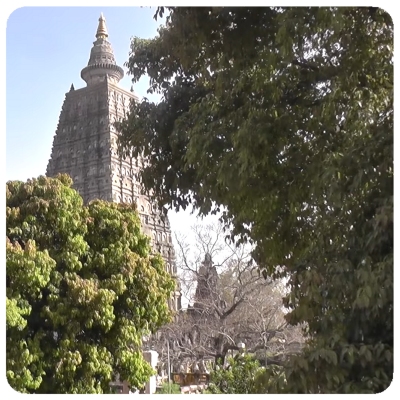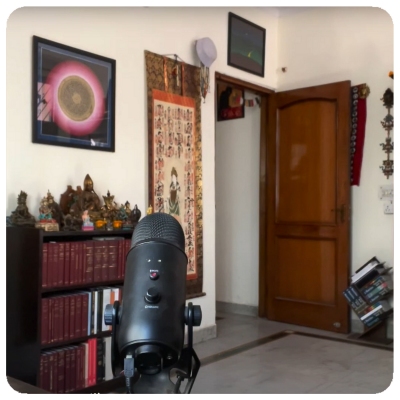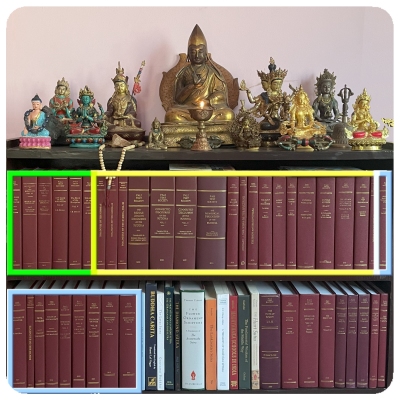
TIPIṬAKA
Also available through:

or through the RSS feed.
In this Chapter of "Buddhist Books Podcast," Edward recites the entire Tipiṭaka (or Tripitaka) translated from the original Pali language directly into English, with light commentary.
Most Recent   |
 |
First Episode   |
|
Rules for Monks
("Defeat")

Buddhist Books: TIPIṬAKA - Part 1 Suttavibhaṅga, Pārājika [00:35:08] May 7th, 2022 This is Part 1 of my recital of the "Tipiṭaka," the "Three Baskets" of pre-sectarian Buddhism, as translated into English from the original Pali Language. In this episode, we'll begin reading "Pārājika," the first part of "Suttavibhaṅga," which is the first part of the "Vinaya Piṭaka," the first of the three "Piṭaka," or "Baskets." "Suttavibhaṅga" means "Rule Analysis," and "Pārājika" literally means "Defeats," referring to the most important rules of monkhood in pre-sectarian Buddhism, for which one can be expelled from the original Buddhist Sangha. • 
Buddhist Books: TIPIṬAKA - Part 2 Suttavibhaṅga, Pārājika [00:33:34] May 8th, 2022 This is Part 2 of my recital of the "Tipiṭaka," the "Three Baskets" of pre-sectarian Buddhism, as translated into English from the original Pali Language. In this episode, we'll continue reading "Pārājika," the first part of "Suttavibhaṅga," which is the first part of the "Vinaya Piṭaka," the first of the three "Piṭaka," or "Baskets." "Suttavibhaṅga" means "Rule Analysis," and "Pārājika" literally means "Defeats," referring to the most important rules of monkhood in pre-sectarian Buddhism, for which one can be expelled from the original Buddhist Sangha. • 
Buddhist Books: TIPIṬAKA - Part 3 Suttavibhaṅga, Pārājika [00:30:08] May 9th, 2022 This is Part 3 of my recital of the "Tipiṭaka," the "Three Baskets" of pre-sectarian Buddhism, as translated into English from the original Pali Language. In this episode, we'll continue reading "Pārājika," the first part of "Suttavibhaṅga," which is the first part of the "Vinaya Piṭaka," the first of the three "Piṭaka," or "Baskets." "Suttavibhaṅga" means "Rule Analysis," and "Pārājika" literally means "Defeats," referring to the most important rules of monkhood in pre-sectarian Buddhism, for which one can be expelled from the original Buddhist Sangha. • 
Buddhist Books: TIPIṬAKA - Part 4 Suttavibhaṅga, Pārājika [00:39:06] May 10th, 2022 This is Part 4 of my recital of the "Tipiṭaka," the "Three Baskets" of pre-sectarian Buddhism, as translated into English from the original Pali Language. In this episode, we'll continue reading "Pārājika," the first part of "Suttavibhaṅga," which is the first part of the "Vinaya Piṭaka," the first of the three "Piṭaka," or "Baskets." "Suttavibhaṅga" means "Rule Analysis," and "Pārājika" literally means "Defeats," referring to the most important rules of monkhood in pre-sectarian Buddhism, for which one can be expelled from the original Buddhist Sangha. • 
Buddhist Books: TIPIṬAKA - Part 5 Suttavibhaṅga, Pārājika [00:33:31] May 11th, 2022 This is Part 5 of my recital of the "Tipiṭaka," the "Three Baskets" of pre-sectarian Buddhism, as translated into English from the original Pali Language. In this episode, we'll continue reading "Pārājika," the first part of "Suttavibhaṅga," which is the first part of the "Vinaya Piṭaka," the first of the three "Piṭaka," or "Baskets." "Suttavibhaṅga" means "Rule Analysis," and "Pārājika" literally means "Defeats," referring to the most important rules of monkhood in pre-sectarian Buddhism, for which one can be expelled from the original Buddhist Sangha. • 
Buddhist Books: TIPIṬAKA - Part 6 Suttavibhaṅga, Pārājika [00:38:06] May 12th, 2022 This is Part 6 of my recital of the "Tipiṭaka," the "Three Baskets" of pre-sectarian Buddhism, as translated into English from the original Pali Language. In this episode, we'll continue reading "Pārājika," the first part of "Suttavibhaṅga," which is the first part of the "Vinaya Piṭaka," the first of the three "Piṭaka," or "Baskets." "Suttavibhaṅga" means "Rule Analysis," and "Pārājika" literally means "Defeats," referring to the most important rules of monkhood in pre-sectarian Buddhism, for which one can be expelled from the original Buddhist Sangha. • 
Buddhist Books: TIPIṬAKA - Part 7 Suttavibhaṅga, Pārājika [01:05:30] June 3rd, 2022 This is Part 7 of my recital of the "Tipiṭaka," the "Three Baskets" of pre-sectarian Buddhism, as translated into English from the original Pali Language. In this episode, we'll continue reading "Pārājika," the first part of "Suttavibhaṅga," which is the first part of the "Vinaya Piṭaka," the first of the three "Piṭaka," or "Baskets." "Suttavibhaṅga" means "Rule Analysis," and "Pārājika" literally means "Defeats," referring to the most important rules of monkhood in pre-sectarian Buddhism, for which one can be expelled from the original Buddhist Sangha. • 
Buddhist Books: TIPIṬAKA - Part 8 Suttavibhaṅga, Pārājika II [00:54:44] June 5th, 2022 This is Part 8 of my recital of the "Tipiṭaka," the "Three Baskets" of pre-sectarian Buddhism, as translated into English from the original Pali Language. In this episode, we'll continue reading "Pārājika," the first part of "Suttavibhaṅga," which is the first part of the "Vinaya Piṭaka," the first of the three "Piṭaka," or "Baskets." "Suttavibhaṅga" means "Rule Analysis," and "Pārājika" literally means "Defeats," referring to the most important rules of monkhood in pre-sectarian Buddhism, for which one can be expelled from the original Buddhist Sangha. • 
Buddhist Books: TIPIṬAKA - Part 9 Suttavibhaṅga, Pārājika II [00:54:56] June 6th, 2022 This is Part 9 of my recital of the "Tipiṭaka," the "Three Baskets" of pre-sectarian Buddhism, as translated into English from the original Pali Language. In this episode, we'll continue reading "Pārājika," the first part of "Suttavibhaṅga," which is the first part of the "Vinaya Piṭaka," the first of the three "Piṭaka," or "Baskets." "Suttavibhaṅga" means "Rule Analysis," and "Pārājika" literally means "Defeats," referring to the most important rules of monkhood in pre-sectarian Buddhism, for which one can be expelled from the original Buddhist Sangha. • 
Buddhist Books: TIPIṬAKA - Part 10 Suttavibhaṅga, Pārājika II [00:43:48] June 10th, 2022 This is Part 10 of my recital of the "Tipiṭaka," the "Three Baskets" of pre-sectarian Buddhism, as translated into English from the original Pali Language. In this episode, we'll continue reading "Pārājika," the first part of "Suttavibhaṅga," which is the first part of the "Vinaya Piṭaka," the first of the three "Piṭaka," or "Baskets." "Suttavibhaṅga" means "Rule Analysis," and "Pārājika" literally means "Defeats," referring to the most important rules of monkhood in pre-sectarian Buddhism, for which one can be expelled from the original Buddhist Sangha. • 
Buddhist Books: TIPIṬAKA - Part 11 Suttavibhaṅga, Pārājika II [00:51:39] June 11th, 2022 This is Part 11 of my recital of the "Tipiṭaka," the "Three Baskets" of pre-sectarian Buddhism, as translated into English from the original Pali Language. In this episode, we'll continue reading "Pārājika," the first part of "Suttavibhaṅga," which is the first part of the "Vinaya Piṭaka," the first of the three "Piṭaka," or "Baskets." "Suttavibhaṅga" means "Rule Analysis," and "Pārājika" literally means "Defeats," referring to the most important rules of monkhood in pre-sectarian Buddhism, for which one can be expelled from the original Buddhist Sangha. • 
Buddhist Books: TIPIṬAKA - Part 12 Suttavibhaṅga, Pārājika II [00:59:37] June 12th, 2022 This is Part 12 of my recital of the "Tipiṭaka," the "Three Baskets" of pre-sectarian Buddhism, as translated into English from the original Pali Language. In this episode, we'll continue reading "Pārājika," the first part of "Suttavibhaṅga," which is the first part of the "Vinaya Piṭaka," the first of the three "Piṭaka," or "Baskets." "Suttavibhaṅga" means "Rule Analysis," and "Pārājika" literally means "Defeats," referring to the most important rules of monkhood in pre-sectarian Buddhism, for which one can be expelled from the original Buddhist Sangha. • 
Buddhist Books: TIPIṬAKA - Part 13 Suttavibhaṅga, Pārājika III [00:55:51] June 14th, 2022 This is Part 13 of my recital of the "Tipiṭaka," the "Three Baskets" of pre-sectarian Buddhism, as translated into English from the original Pali Language. In this episode, we'll continue reading "Pārājika," the first part of "Suttavibhaṅga," which is the first part of the "Vinaya Piṭaka," the first of the three "Piṭaka," or "Baskets." "Suttavibhaṅga" means "Rule Analysis," and "Pārājika" literally means "Defeats," referring to the most important rules of monkhood in pre-sectarian Buddhism, for which one can be expelled from the original Buddhist Sangha. • 
Buddhist Books: TIPIṬAKA - Part 14 Suttavibhaṅga, Pārājika III [00:59:32] June 17th, 2022 This is Part 14 of my recital of the "Tipiṭaka," the "Three Baskets" of pre-sectarian Buddhism, as translated into English from the original Pali Language. In this episode, we'll continue reading "Pārājika," the first part of "Suttavibhaṅga," which is the first part of the "Vinaya Piṭaka," the first of the three "Piṭaka," or "Baskets." "Suttavibhaṅga" means "Rule Analysis," and "Pārājika" literally means "Defeats," referring to the most important rules of monkhood in pre-sectarian Buddhism, for which one can be expelled from the original Buddhist Sangha. • 
Buddhist Books: TIPIṬAKA - Part 15 Suttavibhaṅga, Pārājika IV [00:49:15] June 20th, 2022 This is Part 15 of my recital of the "Tipiṭaka," the "Three Baskets" of pre-sectarian Buddhism, as translated into English from the original Pali Language. In this episode, we'll continue reading "Pārājika," the first part of "Suttavibhaṅga," which is the first part of the "Vinaya Piṭaka," the first of the three "Piṭaka," or "Baskets." "Suttavibhaṅga" means "Rule Analysis," and "Pārājika" literally means "Defeats," referring to the most important rules of monkhood in pre-sectarian Buddhism, for which one can be expelled from the original Buddhist Sangha. • 
Buddhist Books: TIPIṬAKA - Part 16 Suttavibhaṅga, Pārājika IV [00:52:43] June 22nd, 2022 This is Part 16 of my recital of the "Tipiṭaka," the "Three Baskets" of pre-sectarian Buddhism, as translated into English from the original Pali Language. In this episode, we'll continue reading "Pārājika," the first part of "Suttavibhaṅga," which is the first part of the "Vinaya Piṭaka," the first of the three "Piṭaka," or "Baskets." "Suttavibhaṅga" means "Rule Analysis," and "Pārājika" literally means "Defeats," referring to the most important rules of monkhood in pre-sectarian Buddhism, for which one can be expelled from the original Buddhist Sangha. • 
Buddhist Books: TIPIṬAKA - Part 17 Suttavibhaṅga, Pārājika IV [00:28:36] June 24th, 2022 This is Part 17 of my recital of the "Tipiṭaka," the "Three Baskets" of pre-sectarian Buddhism, as translated into English from the original Pali Language. In this episode, we'll finish reading "Pārājika," the first part of "Suttavibhaṅga," which is the first part of the "Vinaya Piṭaka," the first of the three "Piṭaka," or "Baskets." "Suttavibhaṅga" means "Rule Analysis," and "Pārājika" literally means "Defeats," referring to the most important rules of monkhood in pre-sectarian Buddhism, for which one can be expelled from the original Buddhist Sangha. |
("Formal Meeting")

Buddhist Books: TIPIṬAKA - Part 18 Suttavibhaṅga, Saṅghàdisesa I [00:41:32] June 29th, 2022 This is Part 18 of my recital of the "Tipiṭaka," the "Three Baskets" of pre-sectarian Buddhism, as translated into English from the original Pali Language. In this episode, we'll begin reading "Saṅghàdisesa," the second part of "Suttavibhaṅga," which is the first part of the "Vinaya Piṭaka," the first of the three "Piṭaka," or "Baskets." "Suttavibhaṅga" means "Rule Analysis," and "Saṅghàdisesa" literally means "Formal Meeting," referring to the meeting of the monks which must occur if a monk breaks one of these rules. During the meeting, the monk must admit in front of everyone that they broke the rule, and they are then considered on probation, and to be starting over at the beginning of their journey toward enlightenment. • 
Buddhist Books: TIPIṬAKA - Part 19 Suttavibhaṅga, Saṅghàdisesa II [01:13:55] July 1st, 2022 This is Part 19 of my recital of the "Tipiṭaka," the "Three Baskets" of pre-sectarian Buddhism, as translated into English from the original Pali Language. In this episode, we'll continue reading "Saṅghàdisesa," the second part of "Suttavibhaṅga," which is the first part of the "Vinaya Piṭaka," the first of the three "Piṭaka," or "Baskets." "Suttavibhaṅga" means "Rule Analysis," and "Saṅghàdisesa" literally means "Formal Meeting," referring to the meeting of the monks which must occur if a monk breaks one of these rules. During the meeting, the monk must admit in front of everyone that they broke the rule, and they are then considered on probation, and to be starting over at the beginning of their journey toward enlightenment. • 
Buddhist Books: TIPIṬAKA - Part 20 Suttavibhaṅga, Saṅghàdisesa III [00:38:47] July 2nd, 2022 This is Part 20 of my recital of the "Tipiṭaka," the "Three Baskets" of pre-sectarian Buddhism, as translated into English from the original Pali Language. In this episode, we'll continue reading "Saṅghàdisesa," the second part of "Suttavibhaṅga," which is the first part of the "Vinaya Piṭaka," the first of the three "Piṭaka," or "Baskets." "Suttavibhaṅga" means "Rule Analysis," and "Saṅghàdisesa" literally means "Formal Meeting," referring to the meeting of the monks which must occur if a monk breaks one of these rules. During the meeting, the monk must admit in front of everyone that they broke the rule, and they are then considered on probation, and to be starting over at the beginning of their journey toward enlightenment. • 
Buddhist Books: TIPIṬAKA - Part 21 Suttavibhaṅga, Saṅghàdisesa IV & V [01:14:18] July 4th, 2022 This is Part 21 of my recital of the "Tipiṭaka," the "Three Baskets" of pre-sectarian Buddhism, as translated into English from the original Pali Language. In this episode, we'll continue reading "Saṅghàdisesa," the second part of "Suttavibhaṅga," which is the first part of the "Vinaya Piṭaka," the first of the three "Piṭaka," or "Baskets." "Suttavibhaṅga" means "Rule Analysis," and "Saṅghàdisesa" literally means "Formal Meeting," referring to the meeting of the monks which must occur if a monk breaks one of these rules. During the meeting, the monk must admit in front of everyone that they broke the rule, and they are then considered on probation, and to be starting over at the beginning of their journey toward enlightenment. • 
Buddhist Books: TIPIṬAKA - Part 22 Suttavibhaṅga, Saṅghàdisesa VI [00:50:28] July 5th, 2022 This is Part 22 of my recital of the "Tipiṭaka," the "Three Baskets" of pre-sectarian Buddhism, as translated into English from the original Pali Language. In this episode, we'll continue reading "Saṅghàdisesa," the second part of "Suttavibhaṅga," which is the first part of the "Vinaya Piṭaka," the first of the three "Piṭaka," or "Baskets." "Suttavibhaṅga" means "Rule Analysis," and "Saṅghàdisesa" literally means "Formal Meeting," referring to the meeting of the monks which must occur if a monk breaks one of these rules. During the meeting, the monk must admit in front of everyone that they broke the rule, and they are then considered on probation, and to be starting over at the beginning of their journey toward enlightenment. • 
Buddhist Books: TIPIṬAKA - Part 23 Suttavibhaṅga, Saṅghàdisesa VI & VII [00:49:14] July 6th, 2022 This is Part 23 of my recital of the "Tipiṭaka," the "Three Baskets" of pre-sectarian Buddhism, as translated into English from the original Pali Language. In this episode, we'll continue reading "Saṅghàdisesa," the second part of "Suttavibhaṅga," which is the first part of the "Vinaya Piṭaka," the first of the three "Piṭaka," or "Baskets." "Suttavibhaṅga" means "Rule Analysis," and "Saṅghàdisesa" literally means "Formal Meeting," referring to the meeting of the monks which must occur if a monk breaks one of these rules. During the meeting, the monk must admit in front of everyone that they broke the rule, and they are then considered on probation, and to be starting over at the beginning of their journey toward enlightenment. • 
Buddhist Books: TIPIṬAKA - Part 24 Suttavibhaṅga, Saṅghàdisesa VIII [01:05:18] July 7th, 2022 This is Part 24 of my recital of the "Tipiṭaka," the "Three Baskets" of pre-sectarian Buddhism, as translated into English from the original Pali Language. In this episode, we'll continue reading "Saṅghàdisesa," the second part of "Suttavibhaṅga," which is the first part of the "Vinaya Piṭaka," the first of the three "Piṭaka," or "Baskets." "Suttavibhaṅga" means "Rule Analysis," and "Saṅghàdisesa" literally means "Formal Meeting," referring to the meeting of the monks which must occur if a monk breaks one of these rules. During the meeting, the monk must admit in front of everyone that they broke the rule, and they are then considered on probation, and to be starting over at the beginning of their journey toward enlightenment. • 
Buddhist Books: TIPIṬAKA - Part 25 Suttavibhaṅga, Saṅghàdisesa IX [00:45:11] July 9th, 2022 This is Part 25 of my recital of the "Tipiṭaka," the "Three Baskets" of pre-sectarian Buddhism, as translated into English from the original Pali Language. In this episode, we'll continue reading "Saṅghàdisesa," the second part of "Suttavibhaṅga," which is the first part of the "Vinaya Piṭaka," the first of the three "Piṭaka," or "Baskets." "Suttavibhaṅga" means "Rule Analysis," and "Saṅghàdisesa" literally means "Formal Meeting," referring to the meeting of the monks which must occur if a monk breaks one of these rules. During the meeting, the monk must admit in front of everyone that they broke the rule, and they are then considered on probation, and to be starting over at the beginning of their journey toward enlightenment. • 
Buddhist Books: TIPIṬAKA - Part 26 Suttavibhaṅga, Saṅghàdisesa X [00:35:30] July 11th, 2022 This is Part 26 of my recital of the "Tipiṭaka," the "Three Baskets" of pre-sectarian Buddhism, as translated into English from the original Pali Language. In this episode, we'll continue reading "Saṅghàdisesa," the second part of "Suttavibhaṅga," which is the first part of the "Vinaya Piṭaka," the first of the three "Piṭaka," or "Baskets." "Suttavibhaṅga" means "Rule Analysis," and "Saṅghàdisesa" literally means "Formal Meeting," referring to the meeting of the monks which must occur if a monk breaks one of these rules. During the meeting, the monk must admit in front of everyone that they broke the rule, and they are then considered on probation, and to be starting over at the beginning of their journey toward enlightenment. • 
Buddhist Books: TIPIṬAKA - Part 27 Suttavibhaṅga, Saṅghàdisesa XI & XII [00:47:32] July 13th, 2022 This is Part 27 of my recital of the "Tipiṭaka," the "Three Baskets" of pre-sectarian Buddhism, as translated into English from the original Pali Language. In this episode, we'll continue reading "Saṅghàdisesa," the second part of "Suttavibhaṅga," which is the first part of the "Vinaya Piṭaka," the first of the three "Piṭaka," or "Baskets." "Suttavibhaṅga" means "Rule Analysis," and "Saṅghàdisesa" literally means "Formal Meeting," referring to the meeting of the monks which must occur if a monk breaks one of these rules. During the meeting, the monk must admit in front of everyone that they broke the rule, and they are then considered on probation, and to be starting over at the beginning of their journey toward enlightenment. • 
Buddhist Books: TIPIṬAKA - Part 28 Suttavibhaṅga, Saṅghàdisesa XIII [00:46:28] July 14th, 2022 This is Part 28 of my recital of the "Tipiṭaka," the "Three Baskets" of pre-sectarian Buddhism, as translated into English from the original Pali Language. In this episode, we'll finish reading "Saṅghàdisesa," the second part of "Suttavibhaṅga," which is the first part of the "Vinaya Piṭaka," the first of the three "Piṭaka," or "Baskets." "Suttavibhaṅga" means "Rule Analysis," and "Saṅghàdisesa" literally means "Formal Meeting," referring to the meeting of the monks which must occur if a monk breaks one of these rules. During the meeting, the monk must admit in front of everyone that they broke the rule, and they are then considered on probation, and to be starting over at the beginning of their journey toward enlightenment. |
("Undetermined")

Buddhist Books: TIPIṬAKA - Part 29 Suttavibhaṅga, Aniyata I [00:28:37] July 16th, 2022 This is Part 29 of my recital of the "Tipiṭaka," the "Three Baskets" of pre-sectarian Buddhism, as translated into English from the original Pali Language. In this episode, we'll begin reading "Aniyata," the third part of "Suttavibhaṅga," which is the first part of the "Vinaya Piṭaka," the first of the three "Piṭaka," or "Baskets." "Suttavibhaṅga" means "Rule Analysis," and "Aniyata" literally means "Undetermined," referring to situations which need to be taken on a case-by-case basis before they can be determined to be "Defeats," "Formal Meetings," or lesser offences. • 
Buddhist Books: TIPIṬAKA - Part 30 Suttavibhaṅga, Aniyata II [01:22:12] July 17th, 2022 This is Part 30 of my recital of the "Tipiṭaka," the "Three Baskets" of pre-sectarian Buddhism, as translated into English from the original Pali Language. In this episode, we'll finish reading "Aniyata," the third part of "Suttavibhaṅga," which is the first part of the "Vinaya Piṭaka," the first of the three "Piṭaka," or "Baskets." "Suttavibhaṅga" means "Rule Analysis," and "Aniyata" literally means "Undetermined," referring to situations which need to be taken on a case-by-case basis before they can be determined to be "Defeats," "Formal Meetings," or lesser offences. |
("Forfeiture")

Buddhist Books: TIPIṬAKA - Part 31 Suttavibhaṅga, Nissaggiya I [00:43:35] July 18th, 2022 This is Part 31 of my recital of the "Tipiṭaka," the "Three Baskets" of pre-sectarian Buddhism, as translated into English from the original Pali Language. In this episode, we'll begin reading "Nissaggiya," the fourth part of "Suttavibhaṅga," which is the first part of the "Vinaya Piṭaka," the first of the three "Piṭaka," or "Baskets." "Suttavibhaṅga" means "Rule Analysis," and "Nissaggiya" literally means "Forfeiture," referring to the rules of expiation involving forfeiture. • 
Buddhist Books: TIPIṬAKA - Part 32 Suttavibhaṅga, Nissaggiya II & III [00:49:23] July 20th, 2022 This is Part 32 of my recital of the "Tipiṭaka," the "Three Baskets" of pre-sectarian Buddhism, as translated into English from the original Pali Language. In this episode, we'll continue reading "Nissaggiya," the fourth part of "Suttavibhaṅga," which is the first part of the "Vinaya Piṭaka," the first of the three "Piṭaka," or "Baskets." "Suttavibhaṅga" means "Rule Analysis," and "Nissaggiya" literally means "Forfeiture," referring to the rules of expiation involving forfeiture. • 
Buddhist Books: TIPIṬAKA - Part 33 Suttavibhaṅga, Nissaggiya IV & V [00:40:40] July 21st, 2022 This is Part 33 of my recital of the "Tipiṭaka," the "Three Baskets" of pre-sectarian Buddhism, as translated into English from the original Pali Language. In this episode, we'll continue reading "Nissaggiya," the fourth part of "Suttavibhaṅga," which is the first part of the "Vinaya Piṭaka," the first of the three "Piṭaka," or "Baskets." "Suttavibhaṅga" means "Rule Analysis," and "Nissaggiya" literally means "Forfeiture," referring to the rules of expiation involving forfeiture. • 
Buddhist Books: TIPIṬAKA - Part 34 Suttavibhaṅga, Nissaggiya VI & VII [00:41:50] July 23rd, 2022 This is Part 34 of my recital of the "Tipiṭaka," the "Three Baskets" of pre-sectarian Buddhism, as translated into English from the original Pali Language. In this episode, we'll continue reading "Nissaggiya," the fourth part of "Suttavibhaṅga," which is the first part of the "Vinaya Piṭaka," the first of the three "Piṭaka," or "Baskets." "Suttavibhaṅga" means "Rule Analysis," and "Nissaggiya" literally means "Forfeiture," referring to the rules of expiation involving forfeiture. • 
Buddhist Books: TIPIṬAKA - Part 35 Suttavibhaṅga, Nissaggiya VIII & IX [00:45:25] July 24th, 2022 This is Part 35 of my recital of the "Tipiṭaka," the "Three Baskets" of pre-sectarian Buddhism, as translated into English from the original Pali Language. In this episode, we'll continue reading "Nissaggiya," the fourth part of "Suttavibhaṅga," which is the first part of the "Vinaya Piṭaka," the first of the three "Piṭaka," or "Baskets." "Suttavibhaṅga" means "Rule Analysis," and "Nissaggiya" literally means "Forfeiture," referring to the rules of expiation involving forfeiture. • 
Buddhist Books: TIPIṬAKA - Part 36 Suttavibhaṅga, Nissaggiya X & XI [00:33:08] July 26th, 2022 This is Part 36 of my recital of the "Tipiṭaka," the "Three Baskets" of pre-sectarian Buddhism, as translated into English from the original Pali Language. In this episode, we'll continue reading "Nissaggiya," the fourth part of "Suttavibhaṅga," which is the first part of the "Vinaya Piṭaka," the first of the three "Piṭaka," or "Baskets." "Suttavibhaṅga" means "Rule Analysis," and "Nissaggiya" literally means "Forfeiture," referring to the rules of expiation involving forfeiture. • 
Buddhist Books: TIPIṬAKA - Part 37 Suttavibhaṅga, Nissaggiya XII, XIII, XIV & XV [00:41:47] July 31st, 2022 This is Part 37 of my recital of the "Tipiṭaka," the "Three Baskets" of pre-sectarian Buddhism, as translated into English from the original Pali Language. In this episode, we'll continue reading "Nissaggiya," the fourth part of "Suttavibhaṅga," which is the first part of the "Vinaya Piṭaka," the first of the three "Piṭaka," or "Baskets." "Suttavibhaṅga" means "Rule Analysis," and "Nissaggiya" literally means "Forfeiture," referring to the rules of expiation involving forfeiture. • 
Buddhist Books: TIPIṬAKA - Part 38 Suttavibhaṅga, Nissaggiya XVI & XVII [00:29:26] August 1st, 2022 This is Part 38 of my recital of the "Tipiṭaka," the "Three Baskets" of pre-sectarian Buddhism, as translated into English from the original Pali Language. In this episode, we'll continue reading "Nissaggiya," the fourth part of "Suttavibhaṅga," which is the first part of the "Vinaya Piṭaka," the first of the three "Piṭaka," or "Baskets." "Suttavibhaṅga" means "Rule Analysis," and "Nissaggiya" literally means "Forfeiture," referring to the rules of expiation involving forfeiture. • 
Buddhist Books: TIPIṬAKA - Part 39 Suttavibhaṅga, Nissaggiya XVIII [00:52:38] August 2nd, 2022 This is Part 39 of my recital of the "Tipiṭaka," the "Three Baskets" of pre-sectarian Buddhism, as translated into English from the original Pali Language. In this episode, we'll continue reading "Nissaggiya," the fourth part of "Suttavibhaṅga," which is the first part of the "Vinaya Piṭaka," the first of the three "Piṭaka," or "Baskets." "Suttavibhaṅga" means "Rule Analysis," and "Nissaggiya" literally means "Forfeiture," referring to the rules of expiation involving forfeiture. • 
Buddhist Books: TIPIṬAKA - Part 40 Suttavibhaṅga, Nissaggiya XIX, XX & XXI [00:40:05] August 3rd, 2022 This is Part 40 of my recital of the "Tipiṭaka," the "Three Baskets" of pre-sectarian Buddhism, as translated into English from the original Pali Language. In this episode, we'll continue reading "Nissaggiya," the fourth part of "Suttavibhaṅga," which is the first part of the "Vinaya Piṭaka," the first of the three "Piṭaka," or "Baskets." "Suttavibhaṅga" means "Rule Analysis," and "Nissaggiya" literally means "Forfeiture," referring to the rules of expiation involving forfeiture. • 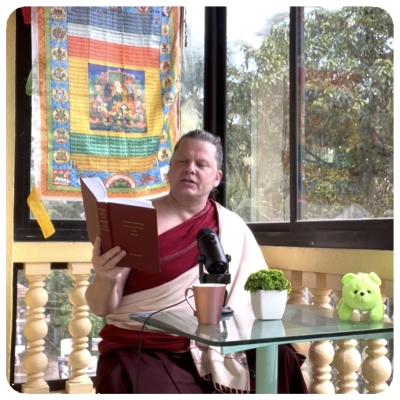
Buddhist Books: TIPIṬAKA - Part 41 Suttavibhaṅga, Nissaggiya XXII & XXIII [00:56:13] August 6th, 2022 This is Part 41 of my recital of the "Tipiṭaka," the "Three Baskets" of pre-sectarian Buddhism, as translated into English from the original Pali Language. In this episode, we'll continue reading "Nissaggiya," the fourth part of "Suttavibhaṅga," which is the first part of the "Vinaya Piṭaka," the first of the three "Piṭaka," or "Baskets." "Suttavibhaṅga" means "Rule Analysis," and "Nissaggiya" literally means "Forfeiture," referring to the rules of expiation involving forfeiture. • 
Buddhist Books: TIPIṬAKA - Part 42 Suttavibhaṅga, Nissaggiya XXIV, XXV & XXVI [00:37:15] August 8th, 2022 This is Part 42 of my recital of the "Tipiṭaka," the "Three Baskets" of pre-sectarian Buddhism, as translated into English from the original Pali Language. In this episode, we'll continue reading "Nissaggiya," the fourth part of "Suttavibhaṅga," which is the first part of the "Vinaya Piṭaka," the first of the three "Piṭaka," or "Baskets." "Suttavibhaṅga" means "Rule Analysis," and "Nissaggiya" literally means "Forfeiture," referring to the rules of expiation involving forfeiture. • 
Buddhist Books: TIPIṬAKA - Part 43 Suttavibhaṅga, Nissaggiya XXVII, XXVIII, XXIX & XXX [01:01:28] August 9th, 2022 This is Part 43 of my recital of the "Tipiṭaka," the "Three Baskets" of pre-sectarian Buddhism, as translated into English from the original Pali Language. In this episode, we'll finish reading "Nissaggiya," the fourth part of "Suttavibhaṅga," which is the first part of the "Vinaya Piṭaka," the first of the three "Piṭaka," or "Baskets." "Suttavibhaṅga" means "Rule Analysis," and "Nissaggiya" literally means "Forfeiture," referring to the rules of expiation involving forfeiture. |
("Expiation")
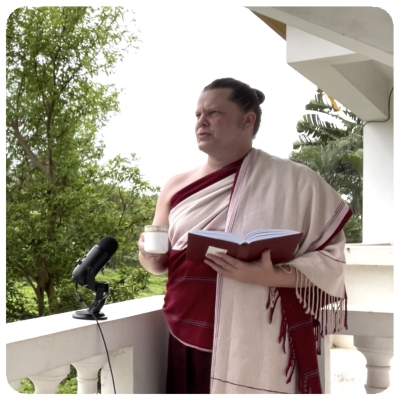
Buddhist Books: TIPIṬAKA - Part 44 Suttavibhaṅga, Pācittiya I [00:30:45] August 12th, 2022 This is Part 44 of my recital of the "Tipiṭaka," the "Three Baskets" of pre-sectarian Buddhism, as translated into English from the original Pali Language. In this episode, we'll begin reading "Pācittiya," the fifth part of "Suttavibhaṅga," which is the first part of the "Vinaya Piṭaka," the first of the three "Piṭaka," or "Baskets." "Suttavibhaṅga" means "Rule Analysis," and "Pācittiya" literally means "Expiation," referring to the rules of expiation, or making amends. • 
Buddhist Books: TIPIṬAKA - Part 45 Suttavibhaṅga, Pācittiya II & III [00:58:30] August 13th, 2022 This is Part 45 of my recital of the "Tipiṭaka," the "Three Baskets" of pre-sectarian Buddhism, as translated into English from the original Pali Language. In this episode, we'll continue reading "Pācittiya," the fifth part of "Suttavibhaṅga," which is the first part of the "Vinaya Piṭaka," the first of the three "Piṭaka," or "Baskets." "Suttavibhaṅga" means "Rule Analysis," and "Pācittiya" literally means "Expiation," referring to the rules of expiation, or making amends. • 
Buddhist Books: TIPIṬAKA - Part 46 Suttavibhaṅga, Pācittiya IV & V [00:25:29] August 15th, 2022 This is Part 46 of my recital of the "Tipiṭaka," the "Three Baskets" of pre-sectarian Buddhism, as translated into English from the original Pali Language. In this episode, we'll continue reading "Pācittiya," the fifth part of "Suttavibhaṅga," which is the first part of the "Vinaya Piṭaka," the first of the three "Piṭaka," or "Baskets." "Suttavibhaṅga" means "Rule Analysis," and "Pācittiya" literally means "Expiation," referring to the rules of expiation, or making amends. • 
Buddhist Books: TIPIṬAKA - Part 47 Suttavibhaṅga, Pācittiya VI, VII & VIII [01:13:12] August 16th, 2022 This is Part 47 of my recital of the "Tipiṭaka," the "Three Baskets" of pre-sectarian Buddhism, as translated into English from the original Pali Language. In this episode, we'll continue reading "Pācittiya," the fifth part of "Suttavibhaṅga," which is the first part of the "Vinaya Piṭaka," the first of the three "Piṭaka," or "Baskets." "Suttavibhaṅga" means "Rule Analysis," and "Pācittiya" literally means "Expiation," referring to the rules of expiation, or making amends. • 
Buddhist Books: TIPIṬAKA - Part 48 Suttavibhaṅga, Pācittiya IX, X & XI [00:33:35] August 18th, 2022 This is Part 48 of my recital of the "Tipiṭaka," the "Three Baskets" of pre-sectarian Buddhism, as translated into English from the original Pali Language. In this episode, we'll continue reading "Pācittiya," the fifth part of "Suttavibhaṅga," which is the first part of the "Vinaya Piṭaka," the first of the three "Piṭaka," or "Baskets." "Suttavibhaṅga" means "Rule Analysis," and "Pācittiya" literally means "Expiation," referring to the rules of expiation, or making amends. • 
Buddhist Books: TIPIṬAKA - Part 49 Suttavibhaṅga, Pācittiya XII & XIII [00:38:55] August 20th, 2022 This is Part 49 of my recital of the "Tipiṭaka," the "Three Baskets" of pre-sectarian Buddhism, as translated into English from the original Pali Language. In this episode, we'll continue reading "Pācittiya," the fifth part of "Suttavibhaṅga," which is the first part of the "Vinaya Piṭaka," the first of the three "Piṭaka," or "Baskets." "Suttavibhaṅga" means "Rule Analysis," and "Pācittiya" literally means "Expiation," referring to the rules of expiation, or making amends. • 
Buddhist Books: TIPIṬAKA - Part 50 Suttavibhaṅga, Pācittiya XIV & XV [00:46:07] August 24th, 2022 This is Part 50 of my recital of the "Tipiṭaka," the "Three Baskets" of pre-sectarian Buddhism, as translated into English from the original Pali Language. In this episode, we'll continue reading "Pācittiya," the fifth part of "Suttavibhaṅga," which is the first part of the "Vinaya Piṭaka," the first of the three "Piṭaka," or "Baskets." "Suttavibhaṅga" means "Rule Analysis," and "Pācittiya" literally means "Expiation," referring to the rules of expiation, or making amends. • 
Buddhist Books: TIPIṬAKA - Part 51 Suttavibhaṅga, Pācittiya XVI, XVII & XVIII [00:33:54] August 27th, 2022 This is Part 51 of my recital of the "Tipiṭaka," the "Three Baskets" of pre-sectarian Buddhism, as translated into English from the original Pali Language. In this episode, we'll continue reading "Pācittiya," the fifth part of "Suttavibhaṅga," which is the first part of the "Vinaya Piṭaka," the first of the three "Piṭaka," or "Baskets." "Suttavibhaṅga" means "Rule Analysis," and "Pācittiya" literally means "Expiation," referring to the rules of expiation, or making amends. • 
Buddhist Books: TIPIṬAKA - Part 52 Suttavibhaṅga, Pācittiya XIX & XX [00:26:25] August 29th, 2022 This is Part 52 of my recital of the "Tipiṭaka," the "Three Baskets" of pre-sectarian Buddhism, as translated into English from the original Pali Language. In this episode, we'll continue reading "Pācittiya," the fifth part of "Suttavibhaṅga," which is the first part of the "Vinaya Piṭaka," the first of the three "Piṭaka," or "Baskets." "Suttavibhaṅga" means "Rule Analysis," and "Pācittiya" literally means "Expiation," referring to the rules of expiation, or making amends. • 
Buddhist Books: TIPIṬAKA - Part 53 Suttavibhaṅga, Pācittiya XXI & XXII [00:49:21] August 31st, 2022 This is Part 53 of my recital of the "Tipiṭaka," the "Three Baskets" of pre-sectarian Buddhism, as translated into English from the original Pali Language. In this episode, we'll continue reading "Pācittiya," the fifth part of "Suttavibhaṅga," which is the first part of the "Vinaya Piṭaka," the first of the three "Piṭaka," or "Baskets." "Suttavibhaṅga" means "Rule Analysis," and "Pācittiya" literally means "Expiation," referring to the rules of expiation, or making amends. • 
Buddhist Books: TIPIṬAKA - Part 54 Suttavibhaṅga, Pācittiya XXIII, XXIV, XXV & XXVI [00:43:54] September 2nd, 2022 This is Part 54 of my recital of the "Tipiṭaka," the "Three Baskets" of pre-sectarian Buddhism, as translated into English from the original Pali Language. In this episode, we'll continue reading "Pācittiya," the fifth part of "Suttavibhaṅga," which is the first part of the "Vinaya Piṭaka," the first of the three "Piṭaka," or "Baskets." "Suttavibhaṅga" means "Rule Analysis," and "Pācittiya" literally means "Expiation," referring to the rules of expiation, or making amends. • 
Buddhist Books: TIPIṬAKA - Part 55 Suttavibhaṅga, Pācittiya XXVII, XVIII & XXIX [00:45:56] September 4th, 2022 This is Part 55 of my recital of the "Tipiṭaka," the "Three Baskets" of pre-sectarian Buddhism, as translated into English from the original Pali Language. In this episode, we'll continue reading "Pācittiya," the fifth part of "Suttavibhaṅga," which is the first part of the "Vinaya Piṭaka," the first of the three "Piṭaka," or "Baskets." "Suttavibhaṅga" means "Rule Analysis," and "Pācittiya" literally means "Expiation," referring to the rules of expiation, or making amends. • 
Buddhist Books: TIPIṬAKA - Part 56 Suttavibhaṅga, Pācittiya XXX, XXXI & XXXII [00:39:56] September 4th, 2022 This is Part 56 of my recital of the "Tipiṭaka," the "Three Baskets" of pre-sectarian Buddhism, as translated into English from the original Pali Language. In this episode, we'll continue reading "Pācittiya," the fifth part of "Suttavibhaṅga," which is the first part of the "Vinaya Piṭaka," the first of the three "Piṭaka," or "Baskets." "Suttavibhaṅga" means "Rule Analysis," and "Pācittiya" literally means "Expiation," referring to the rules of expiation, or making amends. • 
Buddhist Books: TIPIṬAKA - Part 57 Suttavibhaṅga, Pācittiya XXXIII & XXXVI [00:37:34] September 8th, 2022 This is Part 57 of my recital of the "Tipiṭaka," the "Three Baskets" of pre-sectarian Buddhism, as translated into English from the original Pali Language. In this episode, we'll continue reading "Pācittiya," the fifth part of "Suttavibhaṅga," which is the first part of the "Vinaya Piṭaka," the first of the three "Piṭaka," or "Baskets." "Suttavibhaṅga" means "Rule Analysis," and "Pācittiya" literally means "Expiation," referring to the rules of expiation, or making amends. • 
Buddhist Books: TIPIṬAKA - Part 58 Suttavibhaṅga, Pācittiya XXXV, XXXVI & XXXVII [00:38:43] September 26th, 2022 This is Part 58 of my recital of the "Tipiṭaka," the "Three Baskets" of pre-sectarian Buddhism, as translated into English from the original Pali Language. In this episode, we'll continue reading "Pācittiya," the fifth part of "Suttavibhaṅga," which is the first part of the "Vinaya Piṭaka," the first of the three "Piṭaka," or "Baskets." "Suttavibhaṅga" means "Rule Analysis," and "Pācittiya" literally means "Expiation," referring to the rules of expiation, or making amends. • 
Buddhist Books: TIPIṬAKA - Part 59 Suttavibhaṅga, Pācittiya XXXVIII, XXXIX & XL [00:31:09] September 28th, 2022 This is Part 59 of my recital of the "Tipiṭaka," the "Three Baskets" of pre-sectarian Buddhism, as translated into English from the original Pali Language. In this episode, we'll continue reading "Pācittiya," the fifth part of "Suttavibhaṅga," which is the first part of the "Vinaya Piṭaka," the first of the three "Piṭaka," or "Baskets." "Suttavibhaṅga" means "Rule Analysis," and "Pācittiya" literally means "Expiation," referring to the rules of expiation, or making amends. • 
Buddhist Books: TIPIṬAKA - Part 60 Suttavibhaṅga, Pācittiya XLI & XLII [00:33:33] September 30th, 2022 This is Part 60 of my recital of the "Tipiṭaka," the "Three Baskets" of pre-sectarian Buddhism, as translated into English from the original Pali Language. In this episode, we'll continue reading "Pācittiya," the fifth part of "Suttavibhaṅga," which is the first part of the "Vinaya Piṭaka," the first of the three "Piṭaka," or "Baskets." "Suttavibhaṅga" means "Rule Analysis," and "Pācittiya" literally means "Expiation," referring to the rules of expiation, or making amends. • 
Buddhist Books: TIPIṬAKA - Part 61 Suttavibhaṅga, Pācittiya XLIII, XLIV & XLV [00:25:01] October 2nd, 2022 This is Part 61 of my recital of the "Tipiṭaka," the "Three Baskets" of pre-sectarian Buddhism, as translated into English from the original Pali Language. In this episode, we'll continue reading "Pācittiya," the fifth part of "Suttavibhaṅga," which is the first part of the "Vinaya Piṭaka," the first of the three "Piṭaka," or "Baskets." "Suttavibhaṅga" means "Rule Analysis," and "Pācittiya" literally means "Expiation," referring to the rules of expiation, or making amends. • 
Buddhist Books: TIPIṬAKA - Part 62 Suttavibhaṅga, Pācittiya XLVI & XLVII [00:39:02] October 4th, 2022 This is Part 62 of my recital of the "Tipiṭaka," the "Three Baskets" of pre-sectarian Buddhism, as translated into English from the original Pali Language. In this episode, we'll continue reading "Pācittiya," the fifth part of "Suttavibhaṅga," which is the first part of the "Vinaya Piṭaka," the first of the three "Piṭaka," or "Baskets." "Suttavibhaṅga" means "Rule Analysis," and "Pācittiya" literally means "Expiation," referring to the rules of expiation, or making amends. • 
Buddhist Books: TIPIṬAKA - Part 63 Suttavibhaṅga, Pācittiya XLVIII, XLIX & L [00:32:58] October 8th, 2022 This is Part 63 of my recital of the "Tipiṭaka," the "Three Baskets" of pre-sectarian Buddhism, as translated into English from the original Pali Language. In this episode, we'll continue reading "Pācittiya," the fifth part of "Suttavibhaṅga," which is the first part of the "Vinaya Piṭaka," the first of the three "Piṭaka," or "Baskets." "Suttavibhaṅga" means "Rule Analysis," and "Pācittiya" literally means "Expiation," referring to the rules of expiation, or making amends. • 
Buddhist Books: TIPIṬAKA - Part 64 Suttavibhaṅga, Pācittiya LI, LII & LIII [00:38:48] October 10th, 2022 This is Part 64 of my recital of the "Tipiṭaka," the "Three Baskets" of pre-sectarian Buddhism, as translated into English from the original Pali Language. In this episode, we'll continue reading "Pācittiya," the fifth part of "Suttavibhaṅga," which is the first part of the "Vinaya Piṭaka," the first of the three "Piṭaka," or "Baskets." "Suttavibhaṅga" means "Rule Analysis," and "Pācittiya" literally means "Expiation," referring to the rules of expiation, or making amends. • 
Buddhist Books: TIPIṬAKA - Part 65 Suttavibhaṅga, Pācittiya LIV, LV, LVI & LVII [00:46:17] October 15th, 2022 This is Part 65 of my recital of the "Tipiṭaka," the "Three Baskets" of pre-sectarian Buddhism, as translated into English from the original Pali Language. In this episode, we'll continue reading "Pācittiya," the fifth part of "Suttavibhaṅga," which is the first part of the "Vinaya Piṭaka," the first of the three "Piṭaka," or "Baskets." "Suttavibhaṅga" means "Rule Analysis," and "Pācittiya" literally means "Expiation," referring to the rules of expiation, or making amends. • 
Buddhist Books: TIPIṬAKA - Part 66 Suttavibhaṅga, Pācittiya LVIII, LIX & LX [00:34:26] October 17th, 2022 This is Part 66 of my recital of the "Tipiṭaka," the "Three Baskets" of pre-sectarian Buddhism, as translated into English from the original Pali Language. In this episode, we'll continue reading "Pācittiya," the fifth part of "Suttavibhaṅga," which is the first part of the "Vinaya Piṭaka," the first of the three "Piṭaka," or "Baskets." "Suttavibhaṅga" means "Rule Analysis," and "Pācittiya" literally means "Expiation," referring to the rules of expiation, or making amends. • 
Buddhist Books: TIPIṬAKA - Part 67 Suttavibhaṅga, Pācittiya LXI, LXII, LXIII & LXIV [00:31:35] October 20th, 2022 This is Part 67 of my recital of the "Tipiṭaka," the "Three Baskets" of pre-sectarian Buddhism, as translated into English from the original Pali Language. In this episode, we'll continue reading "Pācittiya," the fifth part of "Suttavibhaṅga," which is the first part of the "Vinaya Piṭaka," the first of the three "Piṭaka," or "Baskets." "Suttavibhaṅga" means "Rule Analysis," and "Pācittiya" literally means "Expiation," referring to the rules of expiation, or making amends. • 
Buddhist Books: TIPIṬAKA - Part 68 Suttavibhaṅga, Pācittiya LXV, LXVI & LXVII [00:40:50] October 22nd, 2022 This is Part 68 of my recital of the "Tipiṭaka," the "Three Baskets" of pre-sectarian Buddhism, as translated into English from the original Pali Language. In this episode, we'll continue reading "Pācittiya," the fifth part of "Suttavibhaṅga," which is the first part of the "Vinaya Piṭaka," the first of the three "Piṭaka," or "Baskets." "Suttavibhaṅga" means "Rule Analysis," and "Pācittiya" literally means "Expiation," referring to the rules of expiation, or making amends. • 
Buddhist Books: TIPIṬAKA - Part 69 Suttavibhaṅga, Pācittiya LXVIII & LXIX [00:50:47] October 26th, 2022 This is Part 69 of my recital of the "Tipiṭaka," the "Three Baskets" of pre-sectarian Buddhism, as translated into English from the original Pali Language. In this episode, we'll continue reading "Pācittiya," the fifth part of "Suttavibhaṅga," which is the first part of the "Vinaya Piṭaka," the first of the three "Piṭaka," or "Baskets." "Suttavibhaṅga" means "Rule Analysis," and "Pācittiya" literally means "Expiation," referring to the rules of expiation, or making amends. • 
Buddhist Books: TIPIṬAKA - Part 70 Suttavibhaṅga, Pācittiya LXX & LXXI [00:40:42] October 29th, 2022 This is Part 70 of my recital of the "Tipiṭaka," the "Three Baskets" of pre-sectarian Buddhism, as translated into English from the original Pali Language. In this episode, we'll continue reading "Pācittiya," the fifth part of "Suttavibhaṅga," which is the first part of the "Vinaya Piṭaka," the first of the three "Piṭaka," or "Baskets." "Suttavibhaṅga" means "Rule Analysis," and "Pācittiya" literally means "Expiation," referring to the rules of expiation, or making amends. • 
Buddhist Books: TIPIṬAKA - Part 71 Suttavibhaṅga, Pācittiya LXXII & LXXIII [00:32:54] November 6th, 2022 This is Part 71 of my recital of the "Tipiṭaka," the "Three Baskets" of pre-sectarian Buddhism, as translated into English from the original Pali Language. In this episode, we'll continue reading "Pācittiya," the fifth part of "Suttavibhaṅga," which is the first part of the "Vinaya Piṭaka," the first of the three "Piṭaka," or "Baskets." "Suttavibhaṅga" means "Rule Analysis," and "Pācittiya" literally means "Expiation," referring to the rules of expiation, or making amends. • 
Buddhist Books: TIPIṬAKA - Part 72 Suttavibhaṅga, Pācittiya LXXIV, LXXV, LXXVI & LXXVII [00:32:30] November 12th, 2022 This is Part 72 of my recital of the "Tipiṭaka," the "Three Baskets" of pre-sectarian Buddhism, as translated into English from the original Pali Language. In this episode, we'll continue reading "Pācittiya," the fifth part of "Suttavibhaṅga," which is the first part of the "Vinaya Piṭaka," the first of the three "Piṭaka," or "Baskets." "Suttavibhaṅga" means "Rule Analysis," and "Pācittiya" literally means "Expiation," referring to the rules of expiation, or making amends. • 
Buddhist Books: TIPIṬAKA - Part 73 Suttavibhaṅga, Pācittiya LXXVIII [01:08:36] November 14th, 2022 This is Part 73 of my recital of the "Tipiṭaka," the "Three Baskets" of pre-sectarian Buddhism, as translated into English from the original Pali Language. In this episode, we'll continue reading "Pācittiya," the fifth part of "Suttavibhaṅga," which is the first part of the "Vinaya Piṭaka," the first of the three "Piṭaka," or "Baskets." "Suttavibhaṅga" means "Rule Analysis," and "Pācittiya" literally means "Expiation," referring to the rules of expiation, or making amends. • 
Buddhist Books: TIPIṬAKA - Part 74 Suttavibhaṅga, Pācittiya LXXIX, LXXX & LXXXI [00:30:36] November 17th, 2022 This is Part 74 of my recital of the "Tipiṭaka," the "Three Baskets" of pre-sectarian Buddhism, as translated into English from the original Pali Language. In this episode, we'll continue reading "Pācittiya," the fifth part of "Suttavibhaṅga," which is the first part of the "Vinaya Piṭaka," the first of the three "Piṭaka," or "Baskets." "Suttavibhaṅga" means "Rule Analysis," and "Pācittiya" literally means "Expiation," referring to the rules of expiation, or making amends. • 
Buddhist Books: TIPIṬAKA - Part 75 Suttavibhaṅga, Pācittiya LXXXII & LXXXIII [00:38:34] November 19th, 2022 This is Part 75 of my recital of the "Tipiṭaka," the "Three Baskets" of pre-sectarian Buddhism, as translated into English from the original Pali Language. In this episode, we'll continue reading "Pācittiya," the fifth part of "Suttavibhaṅga," which is the first part of the "Vinaya Piṭaka," the first of the three "Piṭaka," or "Baskets." "Suttavibhaṅga" means "Rule Analysis," and "Pācittiya" literally means "Expiation," referring to the rules of expiation, or making amends. • 
Buddhist Books: TIPIṬAKA - Part 76 Suttavibhaṅga, Pācittiya LXXXIV & LXXXV [00:44:54] November 24th, 2022 This is Part 76 of my recital of the "Tipiṭaka," the "Three Baskets" of pre-sectarian Buddhism, as translated into English from the original Pali Language. In this episode, we'll continue reading "Pācittiya," the fifth part of "Suttavibhaṅga," which is the first part of the "Vinaya Piṭaka," the first of the three "Piṭaka," or "Baskets." "Suttavibhaṅga" means "Rule Analysis," and "Pācittiya" literally means "Expiation," referring to the rules of expiation, or making amends. • 
Buddhist Books: TIPIṬAKA - Part 77 Suttavibhaṅga, Pācittiya LXXXVI, LXXXVII & LXXXVIII [00:27:38] November 28th, 2022 This is Part 77 of my recital of the "Tipiṭaka," the "Three Baskets" of pre-sectarian Buddhism, as translated into English from the original Pali Language. In this episode, we'll continue reading "Pācittiya," the fifth part of "Suttavibhaṅga," which is the first part of the "Vinaya Piṭaka," the first of the three "Piṭaka," or "Baskets." "Suttavibhaṅga" means "Rule Analysis," and "Pācittiya" literally means "Expiation," referring to the rules of expiation, or making amends. • 
Buddhist Books: TIPIṬAKA - Part 78 Suttavibhaṅga, Pācittiya LXXXIX, XC, XCI & XCII [00:26:31] November 30th, 2022 This is Part 78 of my recital of the "Tipiṭaka," the "Three Baskets" of pre-sectarian Buddhism, as translated into English from the original Pali Language. In this episode, we'll finish reading "Pācittiya," the fifth part of "Suttavibhaṅga," which is the first part of the "Vinaya Piṭaka," the first of the three "Piṭaka," or "Baskets." "Suttavibhaṅga" means "Rule Analysis," and "Pācittiya" literally means "Expiation," referring to the rules of expiation, or making amends. |
("Confession")

Buddhist Books: TIPIṬAKA - Part 79 Suttavibhaṅga, Pāṭidesaniya I [00:22:45] December 11th, 2022 This is Part 79 of my recital of the "Tipiṭaka," the "Three Baskets" of pre-sectarian Buddhism, as translated into English from the original Pali Language. In this episode, we'll begin reading "Pāṭidesaniya," the sixth part of "Suttavibhaṅga," which is the first part of the "Vinaya Piṭaka," the first of the three "Piṭaka," or "Baskets." "Suttavibhaṅga" means "Rule Analysis," and "Pāṭidesaniya" literally means "Confession," referring to transgressions which must be confessed. • 
Buddhist Books: TIPIṬAKA - Part 80 Suttavibhaṅga, Pāṭidesaniya II [00:18:26] December 12th, 2022 This is Part 80 of my recital of the "Tipiṭaka," the "Three Baskets" of pre-sectarian Buddhism, as translated into English from the original Pali Language. In this episode, we'll continue reading "Pāṭidesaniya," the sixth part of "Suttavibhaṅga," which is the first part of the "Vinaya Piṭaka," the first of the three "Piṭaka," or "Baskets." "Suttavibhaṅga" means "Rule Analysis," and "Pāṭidesaniya" literally means "Confession," referring to transgressions which must be confessed. • 
Buddhist Books: TIPIṬAKA - Part 81 Suttavibhaṅga, Pāṭidesaniya III [00:34:13] December 13th, 2022 This is Part 81 of my recital of the "Tipiṭaka," the "Three Baskets" of pre-sectarian Buddhism, as translated into English from the original Pali Language. In this episode, we'll continue reading "Pāṭidesaniya," the sixth part of "Suttavibhaṅga," which is the first part of the "Vinaya Piṭaka," the first of the three "Piṭaka," or "Baskets." "Suttavibhaṅga" means "Rule Analysis," and "Pāṭidesaniya" literally means "Confession," referring to transgressions which must be confessed. • 
Buddhist Books: TIPIṬAKA - Part 82 Suttavibhaṅga, Pāṭidesaniya IV [00:26:00] December 15th, 2022 This is Part 82 of my recital of the "Tipiṭaka," the "Three Baskets" of pre-sectarian Buddhism, as translated into English from the original Pali Language. In this episode, we'll finish reading "Pāṭidesaniya," the sixth part of "Suttavibhaṅga," which is the first part of the "Vinaya Piṭaka," the first of the three "Piṭaka," or "Baskets." "Suttavibhaṅga" means "Rule Analysis," and "Pāṭidesaniya" literally means "Confession," referring to transgressions which must be confessed. |
("Good Behaviour")

Buddhist Books: TIPIṬAKA - Part 82 Suttavibhaṅga, Sekhiyā Dhammā 1-10 [00:27:23] December 17th, 2022 This is Part 83 of my recital of the "Tipiṭaka," the "Three Baskets" of pre-sectarian Buddhism, as translated into English from the original Pali Language. In this episode, we'll begin reading "Sekhiyā Dhammā," the sixth part of "Suttavibhaṅga," which is the first part of the "Vinaya Piṭaka," the first of the three "Piṭaka," or "Baskets." "Suttavibhaṅga" means "Rule Analysis," and "Sekhiyā Dhammā" literally means "Good Behaviour" or "Etiquette" referring to the offences of wrong doing. • 
Buddhist Books: TIPIṬAKA - Part 84 Suttavibhaṅga, Sekhiyā Dhammā 11-20 [00:17:50] December 25th, 2022 This is Part 84 of my recital of the "Tipiṭaka," the "Three Baskets" of pre-sectarian Buddhism, as translated into English from the original Pali Language. In this episode, we'll continue reading "Sekhiyā Dhammā," the sixth part of "Suttavibhaṅga," which is the first part of the "Vinaya Piṭaka," the first of the three "Piṭaka," or "Baskets." "Suttavibhaṅga" means "Rule Analysis," and "Sekhiyā Dhammā" literally means "Good Behaviour" or "Etiquette" referring to the offences of wrong doing. • 
Buddhist Books: TIPIṬAKA - Part 85 Suttavibhaṅga, Sekhiyā Dhammā 21-30 [00:17:24] January 1st, 2023 This is Part 85 of my recital of the "Tipiṭaka," the "Three Baskets" of pre-sectarian Buddhism, as translated into English from the original Pali Language. In this episode, we'll continue reading "Sekhiyā Dhammā," the sixth part of "Suttavibhaṅga," which is the first part of the "Vinaya Piṭaka," the first of the three "Piṭaka," or "Baskets." "Suttavibhaṅga" means "Rule Analysis," and "Sekhiyā Dhammā" literally means "Good Behaviour" or "Etiquette" referring to the offences of wrong doing. • 
Buddhist Books: TIPIṬAKA - Part 86 Suttavibhaṅga, Sekhiyā Dhammā 31-40 [00:27:59] January 5th, 2023 This is Part 86 of my recital of the "Tipiṭaka," the "Three Baskets" of pre-sectarian Buddhism, as translated into English from the original Pali Language. In this episode, we'll continue reading "Sekhiyā Dhammā," the sixth part of "Suttavibhaṅga," which is the first part of the "Vinaya Piṭaka," the first of the three "Piṭaka," or "Baskets." "Suttavibhaṅga" means "Rule Analysis," and "Sekhiyā Dhammā" literally means "Good Behaviour" or "Etiquette" referring to the offences of wrong doing. • 
Buddhist Books: TIPIṬAKA - Part 87 Suttavibhaṅga, Sekhiyā Dhammā 41-50 [00:25:08] January 12th, 2023 This is Part 87 of my recital of the "Tipiṭaka," the "Three Baskets" of pre-sectarian Buddhism, as translated into English from the original Pali Language. In this episode, we'll continue reading "Sekhiyā Dhammā," the sixth part of "Suttavibhaṅga," which is the first part of the "Vinaya Piṭaka," the first of the three "Piṭaka," or "Baskets." "Suttavibhaṅga" means "Rule Analysis," and "Sekhiyā Dhammā" literally means "Good Behaviour" or "Etiquette" referring to the offences of wrong doing. • 
Buddhist Books: TIPIṬAKA - Part 88 Suttavibhaṅga, Sekhiyā Dhammā 51-75 [01:13:38] January 16th, 2023 This is Part 88 of my recital of the "Tipiṭaka," the "Three Baskets" of pre-sectarian Buddhism, as translated into English from the original Pali Language. In this episode, we'll finish reading "Sekhiyā Dhammā," the sixth part of "Suttavibhaṅga," which is the first part of the "Vinaya Piṭaka," the first of the three "Piṭaka," or "Baskets." "Suttavibhaṅga" means "Rule Analysis," and "Sekhiyā Dhammā" literally means "Good Behaviour" or "Etiquette" referring to the offences of wrong doing. |
Bhikkhunivibhanga
Rules for Nuns
("Defeat")

Buddhist Books: TIPIṬAKA - Part 89 Bhikkhunivibhaṅga, Pārājika I [00:37:48] January 19th, 2023 This is Part 89 of my recital of the "Tipiṭaka," the "Three Baskets" of pre-sectarian Buddhism, as translated into English from the original Pali Language. In this episode, we'll begin reading "Pārājika," the first part of "Bhikkhunivibhaṅga," from the "Vinaya Piṭaka," the first of the three "Piṭaka," or "Baskets." "Bhikkhunivibhaṅga" literally means "Nuns Analysis," meaning the rules for Buddhist nuns. "Pārājika" literally means "Defeats," referring to the most important rules in pre-sectarian early Buddhism, for which one can be expelled from the original Buddhist Sangha. • 
Buddhist Books: TIPIṬAKA - Part 90 Bhikkhunivibhaṅga, Pārājika II [00:24:03] February 2nd, 2023 This is Part 90 of my recital of the "Tipiṭaka," the "Three Baskets" of pre-sectarian Buddhism, as translated into English from the original Pali Language. In this episode, we'll continue reading "Pārājika," the first part of "Bhikkhunivibhaṅga," from the "Vinaya Piṭaka," the first of the three "Piṭaka," or "Baskets." "Bhikkhunivibhaṅga" literally means "Nuns Analysis," meaning the rules for Buddhist nuns. "Pārājika" literally means "Defeats," referring to the most important rules in pre-sectarian early Buddhism, for which one can be expelled from the original Buddhist Sangha. • 
Buddhist Books: TIPIṬAKA - Part 91 Bhikkhunivibhaṅga, Pārājika III [00:21:00] February 9th, 2023 This is Part 91 of my recital of the "Tipiṭaka," the "Three Baskets" of pre-sectarian Buddhism, as translated into English from the original Pali Language. In this episode, we'll continue reading "Pārājika," the first part of "Bhikkhunivibhaṅga," from the "Vinaya Piṭaka," the first of the three "Piṭaka," or "Baskets." "Bhikkhunivibhaṅga" literally means "Nuns Analysis," meaning the rules for Buddhist nuns. "Pārājika" literally means "Defeats," referring to the most important rules in pre-sectarian early Buddhism, for which one can be expelled from the original Buddhist Sangha. • 
Buddhist Books: TIPIṬAKA - Part 92 Bhikkhunivibhaṅga, Pārājika IV [00:32:35] February 14th, 2023 This is Part 92 of my recital of the "Tipiṭaka," the "Three Baskets" of pre-sectarian Buddhism, as translated into English from the original Pali Language. In this episode, we'll finish reading "Pārājika," the first part of "Bhikkhunivibhaṅga," from the "Vinaya Piṭaka," the first of the three "Piṭaka," or "Baskets." "Bhikkhunivibhaṅga" literally means "Nuns Analysis," meaning the rules for Buddhist nuns. "Pārājika" literally means "Defeats," referring to the most important rules in pre-sectarian early Buddhism, for which one can be expelled from the original Buddhist Sangha. |
("Formal Meeting")

Buddhist Books: TIPIṬAKA - Part 93 Bhikkhunivibhaṅga, Suttavibhaṅga I [00:27:11] March 7th, 2023 This is Part 93 of my recital of the "Tipiṭaka," the "Three Baskets" of pre-sectarian Buddhism, as translated into English from the original Pali Language. In this episode, we'll begin reading "Saṅghàdisesa," the first part of "Bhikkhunivibhaṅga," from the "Vinaya Piṭaka," the first of the three "Piṭaka," or "Baskets." "Bhikkhunivibhaṅga" literally means "Nuns Analysis," meaning the rules for Buddhist nuns. "Saṅghàdisesa" literally means "Formal Meeting," referring to the meeting of the nuns which must occur if a nun breaks one of these rules. During the meeting, the nun must admit in front of everyone that they broke the rule, and they are then considered on probation, and to be starting over at the beginning of their journey toward enlightenment. • 
Buddhist Books: TIPIṬAKA - Part 94 Bhikkhunivibhaṅga, Suttavibhaṅga II [00:30:08] March 12th, 2023 This is Part 94 of my recital of the "Tipiṭaka," the "Three Baskets" of pre-sectarian Buddhism, as translated into English from the original Pali Language. In this episode, we'll continue reading "Saṅghàdisesa," the second part of "Bhikkhunivibhaṅga," from the "Vinaya Piṭaka," the first of the three "Piṭaka," or "Baskets." "Bhikkhunivibhaṅga" literally means "Nuns Analysis," meaning the rules for Buddhist nuns. "Saṅghàdisesa" literally means "Formal Meeting," referring to the meeting of the nuns which must occur if a nun breaks one of these rules. During the meeting, the nun must admit in front of everyone that they broke the rule, and they are then considered on probation, and to be starting over at the beginning of their journey toward enlightenment. • 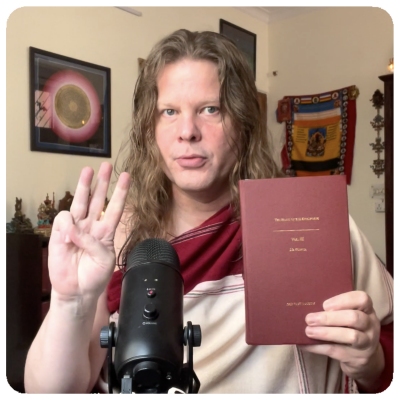
Buddhist Books: TIPIṬAKA - Part 95 Bhikkhunivibhaṅga, Suttavibhaṅga III [00:33:07] May 20th, 2023 This is Part 95 of my recital of the "Tipiṭaka," the "Three Baskets" of pre-sectarian Buddhism, as translated into English from the original Pali Language. In this episode, we'll continue reading "Saṅghàdisesa," the second part of "Bhikkhunivibhaṅga," from the "Vinaya Piṭaka," the first of the three "Piṭaka," or "Baskets." "Bhikkhunivibhaṅga" literally means "Nuns Analysis," meaning the rules for Buddhist nuns. "Saṅghàdisesa" literally means "Formal Meeting," referring to the meeting of the nuns which must occur if a nun breaks one of these rules. During the meeting, the nun must admit in front of everyone that they broke the rule, and they are then considered on probation, and to be starting over at the beginning of their journey toward enlightenment. • 
Buddhist Books: TIPIṬAKA - Part 96 Bhikkhunivibhaṅga, Suttavibhaṅga IV [00:25:11] May 29th, 2023 This is Part 96 of my recital of the "Tipiṭaka," the "Three Baskets" of pre-sectarian Buddhism, as translated into English from the original Pali Language. In this episode, we'll continue reading "Saṅghàdisesa," the second part of "Bhikkhunivibhaṅga," from the "Vinaya Piṭaka," the first of the three "Piṭaka," or "Baskets." "Bhikkhunivibhaṅga" literally means "Nuns Analysis," meaning the rules for Buddhist nuns. "Saṅghàdisesa" literally means "Formal Meeting," referring to the meeting of the nuns which must occur if a nun breaks one of these rules. During the meeting, the nun must admit in front of everyone that they broke the rule, and they are then considered on probation, and to be starting over at the beginning of their journey toward enlightenment. • 
Buddhist Books: TIPIṬAKA - Part 97 Bhikkhunivibhaṅga, Suttavibhaṅga V & VI [00:29:31] June 1st, 2023 This is Part 97 of my recital of the "Tipiṭaka," the "Three Baskets" of pre-sectarian Buddhism, as translated into English from the original Pali Language. In this episode, we'll continue reading "Saṅghàdisesa," the second part of "Bhikkhunivibhaṅga," from the "Vinaya Piṭaka," the first of the three "Piṭaka," or "Baskets." "Bhikkhunivibhaṅga" literally means "Nuns Analysis," meaning the rules for Buddhist nuns. "Saṅghàdisesa" literally means "Formal Meeting," referring to the meeting of the nuns which must occur if a nun breaks one of these rules. During the meeting, the nun must admit in front of everyone that they broke the rule, and they are then considered on probation, and to be starting over at the beginning of their journey toward enlightenment. • 
Buddhist Books: TIPIṬAKA - Part 98 Bhikkhunivibhaṅga, Suttavibhaṅga VII & VIII [00:39:11] June 4th, 2023 This is Part 98 of my recital of the "Tipiṭaka," the "Three Baskets" of pre-sectarian Buddhism, as translated into English from the original Pali Language. In this episode, we'll continue reading "Saṅghàdisesa," the second part of "Bhikkhunivibhaṅga," from the "Vinaya Piṭaka," the first of the three "Piṭaka," or "Baskets." "Bhikkhunivibhaṅga" literally means "Nuns Analysis," meaning the rules for Buddhist nuns. "Saṅghàdisesa" literally means "Formal Meeting," referring to the meeting of the nuns which must occur if a nun breaks one of these rules. During the meeting, the nun must admit in front of everyone that they broke the rule, and they are then considered on probation, and to be starting over at the beginning of their journey toward enlightenment. • 
Buddhist Books: TIPIṬAKA - Part 99 Bhikkhunivibhaṅga, Suttavibhaṅga IX & X [00:35:23] June 9th, 2023 This is Part 99 of my recital of the "Tipiṭaka," the "Three Baskets" of pre-sectarian Buddhism, as translated into English from the original Pali Language. In this episode, we'll finish reading "Saṅghàdisesa," the second part of "Bhikkhunivibhaṅga," from the "Vinaya Piṭaka," the first of the three "Piṭaka," or "Baskets." "Bhikkhunivibhaṅga" literally means "Nuns Analysis," meaning the rules for Buddhist nuns. "Saṅghàdisesa" literally means "Formal Meeting," referring to the meeting of the nuns which must occur if a nun breaks one of these rules. During the meeting, the nun must admit in front of everyone that they broke the rule, and they are then considered on probation, and to be starting over at the beginning of their journey toward enlightenment. |
("Forfeiture")

Buddhist Books: TIPIṬAKA - Part 100 Bhikkhunivibhaṅga, Nissaggiya I [01:24:02] June 23rd, 2023 This is Part 100 of my recital of the "Tipiṭaka," the "Three Baskets" of pre-sectarian Buddhism, as translated into English from the original Pali Language. In this episode, to celebrate this 100th Tipitaka episode, Edward will quickly summarize the various characters, monks and nuns, who behaved in various ways which resulted in the establishing of the rules of the original Sangha, which could be thought of as a kind of "Tipiṭaka Rogues' Gallery." Then, we'll begin reading "Nissaggiya," the fourth part of "Bhikkhunivibhaṅga," which is the second part of the "Vinaya Piṭaka," the first of the three "Piṭaka," or "Baskets." "Bhikkhunivibhaṅga" literally means "Nuns Analysis," meaning the rules for Buddhist nuns. "Nissaggiya" literally means "Forfeiture," referring to the rules of expiation involving forfeiture. • 
Buddhist Books: TIPIṬAKA - Part 101 Bhikkhunivibhaṅga, Nissaggiya II & III [00:27:53] June 26th, 2023 This is Part 101 of my recital of the "Tipiṭaka," the "Three Baskets" of pre-sectarian Buddhism, as translated into English from the original Pali Language. In this episode, we'll continue reading "Nissaggiya," the fourth part of "Bhikkhunivibhaṅga," which is the second part of the "Vinaya Piṭaka," the first of the three "Piṭaka," or "Baskets." "Bhikkhunivibhaṅga" literally means "Nuns Analysis," meaning the rules for Buddhist nuns. "Nissaggiya" literally means "Forfeiture," referring to the rules of expiation involving forfeiture. • 
Buddhist Books: TIPIṬAKA - Part 102 Bhikkhunivibhaṅga, Nissaggiya IV & V [00:24:34] June 30th, 2023 This is Part 102 of my recital of the "Tipiṭaka," the "Three Baskets" of pre-sectarian Buddhism, as translated into English from the original Pali Language. In this episode, we'll continue reading "Nissaggiya," the fourth part of "Bhikkhunivibhaṅga," which is the second part of the "Vinaya Piṭaka," the first of the three "Piṭaka," or "Baskets." "Bhikkhunivibhaṅga" literally means "Nuns Analysis," meaning the rules for Buddhist nuns. "Nissaggiya" literally means "Forfeiture," referring to the rules of expiation involving forfeiture. • 
Buddhist Books: TIPIṬAKA - Part 103 Bhikkhunivibhaṅga, Nissaggiya VI & VII [00:25:33] July 2nd, 2023 This is Part 103 of my recital of the "Tipiṭaka," the "Three Baskets" of pre-sectarian Buddhism, as translated into English from the original Pali Language. In this episode, we'll continue reading "Nissaggiya," the fourth part of "Bhikkhunivibhaṅga," which is the second part of the "Vinaya Piṭaka," the first of the three "Piṭaka," or "Baskets." "Bhikkhunivibhaṅga" literally means "Nuns Analysis," meaning the rules for Buddhist nuns. "Nissaggiya" literally means "Forfeiture," referring to the rules of expiation involving forfeiture. • 
Buddhist Books: TIPIṬAKA - Part 104 Bhikkhunivibhaṅga, Nissaggiya VIII, IX & X [00:24:22] July 2nd, 2023 This is Part 104 of my recital of the "Tipiṭaka," the "Three Baskets" of pre-sectarian Buddhism, as translated into English from the original Pali Language. In this episode, we'll continue reading "Nissaggiya," the fourth part of "Bhikkhunivibhaṅga," which is the second part of the "Vinaya Piṭaka," the first of the three "Piṭaka," or "Baskets." "Bhikkhunivibhaṅga" literally means "Nuns Analysis," meaning the rules for Buddhist nuns. "Nissaggiya" literally means "Forfeiture," referring to the rules of expiation involving forfeiture. • 
Buddhist Books: TIPIṬAKA - Part 105 Bhikkhunivibhaṅga, Nissaggiya XI & XII [00:30:15] July 15th, 2023 This is Part 105 of my recital of the "Tipiṭaka," the "Three Baskets" of pre-sectarian Buddhism, as translated into English from the original Pali Language. In this episode, we'll finish reading "Nissaggiya," the fourth part of "Bhikkhunivibhaṅga," which is the second part of the "Vinaya Piṭaka," the first of the three "Piṭaka," or "Baskets." "Bhikkhunivibhaṅga" literally means "Nuns Analysis," meaning the rules for Buddhist nuns. "Nissaggiya" literally means "Forfeiture," referring to the rules of expiation involving forfeiture. |
("Expiation")

Buddhist Books: TIPIṬAKA - Part 106 Bhikkhunivibhaṅga, Pācittiya I [00:17:51] July 23rd, 2023 This is Part 106 of my recital of the "Tipiṭaka," the "Three Baskets" of pre-sectarian Buddhism, as translated into English from the original Pali Language. In this episode, we'll begin reading "Pācittiya," the fifth part of "Bhikkhunivibhaṅga," which is the second part of the "Vinaya Piṭaka," the first of the three "Piṭaka," or "Baskets." "Bhikkhunivibhaṅga" literally means "Nuns Analysis," meaning the rules for Buddhist nuns. "Pācittiya" literally means "Expiation," referring to the rules of expiation, or making amends. • 
Buddhist Books: TIPIṬAKA - Part 107 Bhikkhunivibhaṅga, Pācittiya II, III & IV [00:25:12] July 25th, 2023 This is Part 107 of my recital of the "Tipiṭaka," the "Three Baskets" of pre-sectarian Buddhism, as translated into English from the original Pali Language. In this episode, we'll continue reading "Pācittiya," the fifth part of "Bhikkhunivibhaṅga," which is the second part of the "Vinaya Piṭaka," the first of the three "Piṭaka," or "Baskets." "Bhikkhunivibhaṅga" literally means "Nuns Analysis," meaning the rules for Buddhist nuns. "Pācittiya" literally means "Expiation," referring to the rules of expiation, or making amends. • 
Buddhist Books: TIPIṬAKA - Part 108 Bhikkhunivibhaṅga, Pācittiya V, VI & VII [00:26:18] July 28th, 2023 This is Part 108 of my recital of the "Tipiṭaka," the "Three Baskets" of pre-sectarian Buddhism, as translated into English from the original Pali Language. In this episode, we'll continue reading "Pācittiya," the fifth part of "Bhikkhunivibhaṅga," which is the second part of the "Vinaya Piṭaka," the first of the three "Piṭaka," or "Baskets." "Bhikkhunivibhaṅga" literally means "Nuns Analysis," meaning the rules for Buddhist nuns. "Pācittiya" literally means "Expiation," referring to the rules of expiation, or making amends. • 
Buddhist Books: TIPIṬAKA - Part 109 Bhikkhunivibhaṅga, Pācittiya VIII, IX & X [00:27:42] July 31st, 2023 This is Part 109 of my recital of the "Tipiṭaka," the "Three Baskets" of pre-sectarian Buddhism, as translated into English from the original Pali Language. In this episode, we'll continue reading "Pācittiya," the fifth part of "Bhikkhunivibhaṅga," which is the second part of the "Vinaya Piṭaka," the first of the three "Piṭaka," or "Baskets." "Bhikkhunivibhaṅga" literally means "Nuns Analysis," meaning the rules for Buddhist nuns. "Pācittiya" literally means "Expiation," referring to the rules of expiation, or making amends. • 
Buddhist Books: TIPIṬAKA - Part 110 Bhikkhunivibhaṅga, Pācittiya XI, XII, XIII & XIV [00:24:41] August 2nd, 2023 This is Part 110 of my recital of the "Tipiṭaka," the "Three Baskets" of pre-sectarian Buddhism, as translated into English from the original Pali Language. In this episode, we'll continue reading "Pācittiya," the fifth part of "Bhikkhunivibhaṅga," which is the second part of the "Vinaya Piṭaka," the first of the three "Piṭaka," or "Baskets." "Bhikkhunivibhaṅga" literally means "Nuns Analysis," meaning the rules for Buddhist nuns. "Pācittiya" literally means "Expiation," referring to the rules of expiation, or making amends. • 
Buddhist Books: TIPIṬAKA - Part 111 Bhikkhunivibhaṅga, Pācittiya XV, XVI & XVII [00:30:09] August 8th, 2023 This is Part 111 of my recital of the "Tipiṭaka," the "Three Baskets" of pre-sectarian Buddhism, as translated into English from the original Pali Language. In this episode, we'll continue reading "Pācittiya," the fifth part of "Bhikkhunivibhaṅga," which is the second part of the "Vinaya Piṭaka," the first of the three "Piṭaka," or "Baskets." "Bhikkhunivibhaṅga" literally means "Nuns Analysis," meaning the rules for Buddhist nuns. "Pācittiya" literally means "Expiation," referring to the rules of expiation, or making amends. • 
Buddhist Books: TIPIṬAKA - Part 112 Bhikkhunivibhaṅga, Pācittiya XVIII, XIX & XX [00:23:14] August 15th, 2023 This is Part 112 of my recital of the "Tipiṭaka," the "Three Baskets" of pre-sectarian Buddhism, as translated into English from the original Pali Language. In this episode, we'll continue reading "Pācittiya," the fifth part of "Bhikkhunivibhaṅga," which is the second part of the "Vinaya Piṭaka," the first of the three "Piṭaka," or "Baskets." "Bhikkhunivibhaṅga" literally means "Nuns Analysis," meaning the rules for Buddhist nuns. "Pācittiya" literally means "Expiation," referring to the rules of expiation, or making amends. • 
Buddhist Books: TIPIṬAKA - Part 113 Bhikkhunivibhaṅga, Pācittiya XXI, XXII & XXIII [00:27:59] August 19th, 2023 This is Part 113 of my recital of the "Tipiṭaka," the "Three Baskets" of pre-sectarian Buddhism, as translated into English from the original Pali Language. In this episode, we'll continue reading "Pācittiya," the fifth part of "Bhikkhunivibhaṅga," which is the second part of the "Vinaya Piṭaka," the first of the three "Piṭaka," or "Baskets." "Bhikkhunivibhaṅga" literally means "Nuns Analysis," meaning the rules for Buddhist nuns. "Pācittiya" literally means "Expiation," referring to the rules of expiation, or making amends. • 
Buddhist Books: TIPIṬAKA - Part 114 Bhikkhunivibhaṅga, Pācittiya XXIV, XXV, XXVI & XXVII [00:29:29] August 24th, 2023 This is Part 114 of my recital of the "Tipiṭaka," the "Three Baskets" of pre-sectarian Buddhism, as translated into English from the original Pali Language. In this episode, we'll continue reading "Pācittiya," the fifth part of "Bhikkhunivibhaṅga," which is the second part of the "Vinaya Piṭaka," the first of the three "Piṭaka," or "Baskets." "Bhikkhunivibhaṅga" literally means "Nuns Analysis," meaning the rules for Buddhist nuns. "Pācittiya" literally means "Expiation," referring to the rules of expiation, or making amends. • 
Buddhist Books: TIPIṬAKA - Part 115 Bhikkhunivibhaṅga, Pācittiya XXVIII, XXIX & XXX [00:27:37] August 28th, 2023 This is Part 115 of my recital of the "Tipiṭaka," the "Three Baskets" of pre-sectarian Buddhism, as translated into English from the original Pali Language. In this episode, we'll continue reading "Pācittiya," the fifth part of "Bhikkhunivibhaṅga," which is the second part of the "Vinaya Piṭaka," the first of the three "Piṭaka," or "Baskets." "Bhikkhunivibhaṅga" literally means "Nuns Analysis," meaning the rules for Buddhist nuns. "Pācittiya" literally means "Expiation," referring to the rules of expiation, or making amends. • 
Buddhist Books: TIPIṬAKA - Part 116 Bhikkhunivibhaṅga, Pācittiya XXXI, XXXII, XXXIII & XXXIV [00:25:56] September 1st, 2023 This is Part 116 of my recital of the "Tipiṭaka," the "Three Baskets" of pre-sectarian Buddhism, as translated into English from the original Pali Language. In this episode, we'll continue reading "Pācittiya," the fifth part of "Bhikkhunivibhaṅga," which is the second part of the "Vinaya Piṭaka," the first of the three "Piṭaka," or "Baskets." "Bhikkhunivibhaṅga" literally means "Nuns Analysis," meaning the rules for Buddhist nuns. "Pācittiya" literally means "Expiation," referring to the rules of expiation, or making amends. • 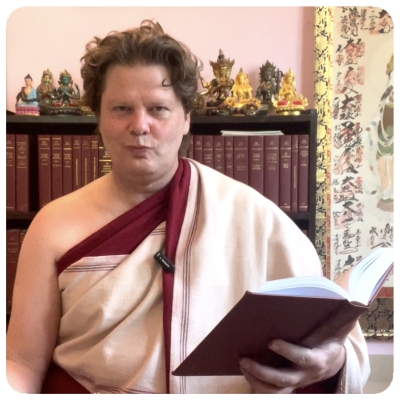
Buddhist Books: TIPIṬAKA - Part 117 Bhikkhunivibhaṅga, Pācittiya XXXV, XXXVI, XXXVII & XXXVIII [00:36:37] September 3rd, 2023 This is Part 117 of my recital of the "Tipiṭaka," the "Three Baskets" of pre-sectarian Buddhism, as translated into English from the original Pali Language. In this episode, we'll continue reading "Pācittiya," the fifth part of "Bhikkhunivibhaṅga," which is the second part of the "Vinaya Piṭaka," the first of the three "Piṭaka," or "Baskets." "Bhikkhunivibhaṅga" literally means "Nuns Analysis," meaning the rules for Buddhist nuns. "Pācittiya" literally means "Expiation," referring to the rules of expiation, or making amends. • 
Buddhist Books: TIPIṬAKA - Part 118 Bhikkhunivibhaṅga, Pācittiya XXXIX, XL, XLI & XLII [00:27:15] September 7th, 2023 This is Part 118 of my recital of the "Tipiṭaka," the "Three Baskets" of pre-sectarian Buddhism, as translated into English from the original Pali Language. In this episode, we'll continue reading "Pācittiya," the fifth part of "Bhikkhunivibhaṅga," which is the second part of the "Vinaya Piṭaka," the first of the three "Piṭaka," or "Baskets." "Bhikkhunivibhaṅga" literally means "Nuns Analysis," meaning the rules for Buddhist nuns. "Pācittiya" literally means "Expiation," referring to the rules of expiation, or making amends. • 
Buddhist Books: TIPIṬAKA - Part 119 Bhikkhunivibhaṅga, Pācittiya XLII, XLIII, XLIV, XLV, XLVI & XLVII [00:34:14] September 25th, 2023 This is Part 119 of my recital of the "Tipiṭaka," the "Three Baskets" of pre-sectarian Buddhism, as translated into English from the original Pali Language. In this episode, we'll continue reading "Pācittiya," the fifth part of "Bhikkhunivibhaṅga," which is the second part of the "Vinaya Piṭaka," the first of the three "Piṭaka," or "Baskets." "Bhikkhunivibhaṅga" literally means "Nuns Analysis," meaning the rules for Buddhist nuns. "Pācittiya" literally means "Expiation," referring to the rules of expiation, or making amends. • 
Buddhist Books: TIPIṬAKA - Part 120 Bhikkhunivibhaṅga, Pācittiya XLVIII, XLIX, L & LI [00:26:37] September 28th, 2023 This is Part 120 of my recital of the "Tipiṭaka," the "Three Baskets" of pre-sectarian Buddhism, as translated into English from the original Pali Language. In this episode, we'll continue reading "Pācittiya," the fifth part of "Bhikkhunivibhaṅga," which is the second part of the "Vinaya Piṭaka," the first of the three "Piṭaka," or "Baskets." "Bhikkhunivibhaṅga" literally means "Nuns Analysis," meaning the rules for Buddhist nuns. "Pācittiya" literally means "Expiation," referring to the rules of expiation, or making amends. • 
Buddhist Books: TIPIṬAKA - Part 121 Bhikkhunivibhaṅga, Pācittiya LII, LIII, LIV & LV [00:32:49] September 28th, 2023 This is Part 121 of my recital of the "Tipiṭaka," the "Three Baskets" of pre-sectarian Buddhism, as translated into English from the original Pali Language. In this episode, we'll continue reading "Pācittiya," the fifth part of "Bhikkhunivibhaṅga," which is the second part of the "Vinaya Piṭaka," the first of the three "Piṭaka," or "Baskets." "Bhikkhunivibhaṅga" literally means "Nuns Analysis," meaning the rules for Buddhist nuns. "Pācittiya" literally means "Expiation," referring to the rules of expiation, or making amends. • 
Buddhist Books: TIPIṬAKA - Part 122 Bhikkhunivibhaṅga, Pācittiya LVI, LVII, LVIII, LIX & LX [00:37:54] October 2nd, 2023 This is Part 122 of my recital of the "Tipiṭaka," the "Three Baskets" of pre-sectarian Buddhism, as translated into English from the original Pali Language. In this episode, we'll continue reading "Pācittiya," the fifth part of "Bhikkhunivibhaṅga," which is the second part of the "Vinaya Piṭaka," the first of the three "Piṭaka," or "Baskets." "Bhikkhunivibhaṅga" literally means "Nuns Analysis," meaning the rules for Buddhist nuns. "Pācittiya" literally means "Expiation," referring to the rules of expiation, or making amends. • 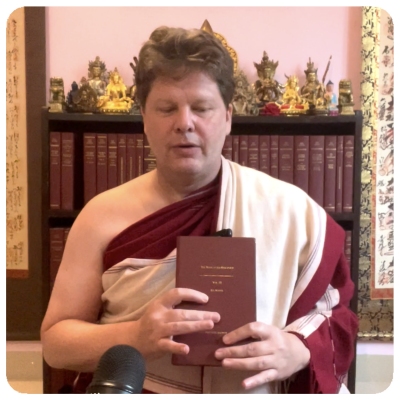
Buddhist Books: TIPIṬAKA - Part 123 Bhikkhunivibhaṅga, Pācittiya LXI, LXII & LXIII [00:32:54] October 5th, 2023 This is Part 123 of my recital of the "Tipiṭaka," the "Three Baskets" of pre-sectarian Buddhism, as translated into English from the original Pali Language. In this episode, we'll continue reading "Pācittiya," the fifth part of "Bhikkhunivibhaṅga," which is the second part of the "Vinaya Piṭaka," the first of the three "Piṭaka," or "Baskets." "Bhikkhunivibhaṅga" literally means "Nuns Analysis," meaning the rules for Buddhist nuns. "Pācittiya" literally means "Expiation," referring to the rules of expiation, or making amends. • 
Buddhist Books: TIPIṬAKA - Part 124 Bhikkhunivibhaṅga, Pācittiya LXIV, LXV, LXVI, LXVII & LXVIII [00:32:50] November 11th, 2023 This is Part 124 of my recital of the "Tipiṭaka," the "Three Baskets" of pre-sectarian Buddhism, as translated into English from the original Pali Language. In this episode, we'll continue reading "Pācittiya," the fifth part of "Bhikkhunivibhaṅga," which is the second part of the "Vinaya Piṭaka," the first of the three "Piṭaka," or "Baskets." "Bhikkhunivibhaṅga" literally means "Nuns Analysis," meaning the rules for Buddhist nuns. "Pācittiya" literally means "Expiation," referring to the rules of expiation, or making amends. • 
Buddhist Books: TIPIṬAKA - Part 125 Bhikkhunivibhaṅga, Pācittiya LXIX, LXX, LXXI, LXXII, LXXIII & LXVIV [00:31:59] November 21st, 2023 This is Part 125 of my recital of the "Tipiṭaka," the "Three Baskets" of pre-sectarian Buddhism, as translated into English from the original Pali Language. In this episode, we'll continue reading "Pācittiya," the fifth part of "Bhikkhunivibhaṅga," which is the second part of the "Vinaya Piṭaka," the first of the three "Piṭaka," or "Baskets." "Bhikkhunivibhaṅga" literally means "Nuns Analysis," meaning the rules for Buddhist nuns. "Pācittiya" literally means "Expiation," referring to the rules of expiation, or making amends. • 
Buddhist Books: TIPIṬAKA - Part 126 Bhikkhunivibhaṅga, Pācittiya LXXV, LXXVI, LXXVII, LXXVIII, LXXIX & LXXX [00:33:21] November 27th, 2023 This is Part 126 of my recital of the "Tipiṭaka," the "Three Baskets" of pre-sectarian Buddhism, as translated into English from the original Pali Language. In this episode, we'll continue reading "Pācittiya," the fifth part of "Bhikkhunivibhaṅga," which is the second part of the "Vinaya Piṭaka," the first of the three "Piṭaka," or "Baskets." "Bhikkhunivibhaṅga" literally means "Nuns Analysis," meaning the rules for Buddhist nuns. "Pācittiya" literally means "Expiation," referring to the rules of expiation, or making amends. • 
Buddhist Books: TIPIṬAKA - Part 127 Bhikkhunivibhaṅga, Pācittiya LXXXI, LXXXII, LXXXIII, LXXXIV & LXXXV [00:36:17] December 18th, 2023 This is Part 127 of my recital of the "Tipiṭaka," the "Three Baskets" of pre-sectarian Buddhism, as translated into English from the original Pali Language. In this episode, we'll continue reading "Pācittiya," the fifth part of "Bhikkhunivibhaṅga," which is the second part of the "Vinaya Piṭaka," the first of the three "Piṭaka," or "Baskets." "Bhikkhunivibhaṅga" literally means "Nuns Analysis," meaning the rules for Buddhist nuns. "Pācittiya" literally means "Expiation," referring to the rules of expiation, or making amends. • 
Buddhist Books: TIPIṬAKA - Part 128 Bhikkhunivibhaṅga, Pācittiya LXXXVI, LXXXVII, LXXXVIII, LXXXIX, XC, XCI, XCII, XCII, XCIII, XCIV, XCV & XCVI [00:36:13] December 20th, 2023 This is Part 128 of my recital of the "Tipiṭaka," the "Three Baskets" of pre-sectarian Buddhism, as translated into English from the original Pali Language. In this episode, we'll finish reading "Pācittiya," the fifth part of "Bhikkhunivibhaṅga," which is the second part of the "Vinaya Piṭaka," the first of the three "Piṭaka," or "Baskets." "Bhikkhunivibhaṅga" literally means "Nuns Analysis," meaning the rules for Buddhist nuns. "Pācittiya" literally means "Expiation," referring to the rules of expiation, or making amends. |
& Sekhiyā Dhammā
("Confession,"
and "Good Behaviour")

Buddhist Books: TIPIṬAKA - Part 129 Bhikkhunivibhaṅga, Pāṭidesaniya & Sekhiyā Dhammā [00:32:38] December 25th, 2023 This is Part 129 of my recital of the "Tipiṭaka," the "Three Baskets" of pre-sectarian Buddhism, as translated into English from the original Pali Language. In this episode, we'll read "Pāṭidesaniya," and "Sekhiyā Dhammā" the sixth and seventh parts of "Bhikkhunivibhaṅga," which is the second part of the "Vinaya Piṭaka," the first of the three "Piṭaka," or "Baskets." "Bhikkhunivibhaṅga" literally means "Nuns Analysis," meaning the rules for Buddhist nuns. "Pāṭidesaniya" literally means "Confession," referring to transgressions which must be confessed, and "Sekhiyā Dhammā" literally means "Good Behaviour" or "Etiquette" referring to the offences of wrong doing. |
("The Great Division")
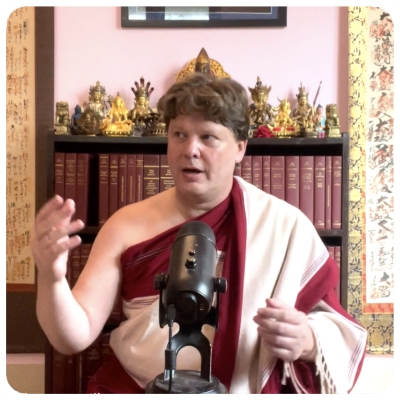
Buddhist Books: TIPIṬAKA 130 Mahāvagga I - Part 1 & Sekhiyā Dhammā [00:44:15] January 3rd, 2023 This is Part 130 of my recital of the "Tipiṭaka," the "Three Baskets" of pre-sectarian Buddhism, as translated into English from the original Pali Language. In this episode, we'll begin reading "Mahāvagga I," from the "Vinaya Piṭaka," the first of the three "Piṭaka," or "Baskets." "Mahāvagga" literally means "Great Division." • 
Buddhist Books: TIPIṬAKA 131 Mahāvagga I - Part 2 [00:39:08] January 10th, 2023 This is Part 131 of my recital of the "Tipiṭaka," the "Three Baskets" of pre-sectarian Buddhism, as translated into English from the original Pali Language. In this episode, we'll continue reading "Mahāvagga I," from the "Vinaya Piṭaka," the first of the three "Piṭaka," or "Baskets." "Mahāvagga" literally means "Great Division." • 
Buddhist Books: TIPIṬAKA 132 Mahāvagga I - Part 3 [00:33:10] January 13th, 2023 This is Part 132 of my recital of the "Tipiṭaka," the "Three Baskets" of pre-sectarian Buddhism, as translated into English from the original Pali Language. In this episode, we'll continue reading "Mahāvagga I," from the "Vinaya Piṭaka," the first of the three "Piṭaka," or "Baskets." "Mahāvagga" literally means "Great Division." • 
Buddhist Books: TIPIṬAKA 133 Mahāvagga I - Part 4 [00:51:48] January 28th, 2023 This is Part 133 of my recital of the "Tipiṭaka," the "Three Baskets" of pre-sectarian Buddhism, as translated into English from the original Pali Language. In this episode, we'll continue reading "Mahāvagga I," from the "Vinaya Piṭaka," the first of the three "Piṭaka," or "Baskets." "Mahāvagga" literally means "Great Division." • 
Buddhist Books: TIPIṬAKA 134 Mahāvagga I - Part 5 [00:36:37] February 1st, 2023 This is Part 134 of my recital of the "Tipiṭaka," the "Three Baskets" of pre-sectarian Buddhism, as translated into English from the original Pali Language. In this episode, we'll continue reading "Mahāvagga I," from the "Vinaya Piṭaka," the first of the three "Piṭaka," or "Baskets." "Mahāvagga" literally means "Great Division." • 
Buddhist Books: TIPIṬAKA 135 Mahāvagga I - Part 6 [00:37:54] February 4th, 2023 This is Part 135 of my recital of the "Tipiṭaka," the "Three Baskets" of pre-sectarian Buddhism, as translated into English from the original Pali Language. In this episode, we'll continue reading "Mahāvagga I," from the "Vinaya Piṭaka," the first of the three "Piṭaka," or "Baskets." "Mahāvagga" literally means "Great Division." • 
Buddhist Books: TIPIṬAKA 136 Mahāvagga I - Part 7 [00:34:13] February 17th, 2024 This is Part 136 of my recital of the "Tipiṭaka," the "Three Baskets" of pre-sectarian Buddhism, as translated into English from the original Pali Language. In this episode, we'll continue reading "Mahāvagga I," from the "Vinaya Piṭaka," the first of the three "Piṭaka," or "Baskets." "Mahāvagga" literally means "Great Division." • 
Buddhist Books: TIPIṬAKA 137 Mahāvagga I - Part 8 [00:32:21] February 24th, 2024 This is Part 137 of my recital of the "Tipiṭaka," the "Three Baskets" of pre-sectarian Buddhism, as translated into English from the original Pali Language. In this episode, we'll continue reading "Mahāvagga I," from the "Vinaya Piṭaka," the first of the three "Piṭaka," or "Baskets." "Mahāvagga" literally means "Great Division." • 
Buddhist Books: TIPIṬAKA 138 Mahāvagga I - Part 9 [00:39:17] March 5th, 2024 This is Part 138 of my recital of the "Tipiṭaka," the "Three Baskets" of pre-sectarian Buddhism, as translated into English from the original Pali Language. In this episode, we'll continue reading "Mahāvagga I," from the "Vinaya Piṭaka," the first of the three "Piṭaka," or "Baskets." "Mahāvagga" literally means "Great Division." • 
Buddhist Books: TIPIṬAKA 139 Mahāvagga I - Part 10 [00:44:45] March 21st, 2024 This is Part 139 of my recital of the "Tipiṭaka," the "Three Baskets" of pre-sectarian Buddhism, as translated into English from the original Pali Language. In this episode, we'll continue reading "Mahāvagga I," from the "Vinaya Piṭaka," the first of the three "Piṭaka," or "Baskets." "Mahāvagga" literally means "Great Division." • 
Buddhist Books: TIPIṬAKA 140 Mahāvagga I - Part 11 [00:36:11] March 25th, 2024 This is Part 140 of my recital of the "Tipiṭaka," the "Three Baskets" of pre-sectarian Buddhism, as translated into English from the original Pali Language. In this episode, we'll continue reading "Mahāvagga I," from the "Vinaya Piṭaka," the first of the three "Piṭaka," or "Baskets." "Mahāvagga" literally means "Great Division." • 
Buddhist Books: TIPIṬAKA 141 Mahāvagga I - Part 12 [00:37:51] March 25th, 2024 This is Part 141 of my recital of the "Tipiṭaka," the "Three Baskets" of pre-sectarian Buddhism, as translated into English from the original Pali Language. In this episode, we'll continue reading "Mahāvagga I," from the "Vinaya Piṭaka," the first of the three "Piṭaka," or "Baskets." "Mahāvagga" literally means "Great Division." • 
Buddhist Books: TIPIṬAKA 142 Mahāvagga I - Part 13 [00:31:48] March 31st, 2024 This is Part 142 of my recital of the "Tipiṭaka," the "Three Baskets" of pre-sectarian Buddhism, as translated into English from the original Pali Language. In this episode, we'll continue reading "Mahāvagga I," from the "Vinaya Piṭaka," the first of the three "Piṭaka," or "Baskets." "Mahāvagga" literally means "Great Division." • 
Buddhist Books: TIPIṬAKA 143 Mahāvagga I - Part 14 [00:30:57] April 11th, 2024 This is Part 143 of my recital of the "Tipiṭaka," the "Three Baskets" of pre-sectarian Buddhism, as translated into English from the original Pali Language. In this episode, we'll continue reading "Mahāvagga I," from the "Vinaya Piṭaka," the first of the three "Piṭaka," or "Baskets." "Mahāvagga" literally means "Great Division." • 
Buddhist Books: TIPIṬAKA 144 Mahāvagga I - Part 15 [00:32:14] April 19th, 2024 This is Part 144 of my recital of the "Tipiṭaka," the "Three Baskets" of pre-sectarian Buddhism, as translated into English from the original Pali Language. In this episode, we'll finish reading "Mahāvagga I," from the "Vinaya Piṭaka," the first of the three "Piṭaka," or "Baskets." "Mahāvagga" literally means "Great Division." • 
Buddhist Books: TIPIṬAKA 145 Mahāvagga II - Part 1 [00:37:13] April 22nd, 2024 This is Part 145 of my recital of the "Tipiṭaka," the "Three Baskets" of pre-sectarian Buddhism, as translated into English from the original Pali Language. In this episode, we'll begin reading "Mahāvagga II," from the "Vinaya Piṭaka," the first of the three "Piṭaka," or "Baskets." "Mahāvagga" literally means "Great Division." • 
Buddhist Books: TIPIṬAKA 146 Mahāvagga II - Part 2 [00:35:17] April 26th, 2024 This is Part 146 of my recital of the "Tipiṭaka," the "Three Baskets" of pre-sectarian Buddhism, as translated into English from the original Pali Language. In this episode, we'll continue reading "Mahāvagga II," from the "Vinaya Piṭaka," the first of the three "Piṭaka," or "Baskets." "Mahāvagga" literally means "Great Division." • 
Buddhist Books: TIPIṬAKA 147 Mahāvagga II - Part 3 [00:28:40] May 24th, 2024 This is Part 147 of my recital of the "Tipiṭaka," the "Three Baskets" of pre-sectarian Buddhism, as translated into English from the original Pali Language. In this episode, we'll continue reading "Mahāvagga II," from the "Vinaya Piṭaka," the first of the three "Piṭaka," or "Baskets." "Mahāvagga" literally means "Great Division." • 
Buddhist Books: TIPIṬAKA 148 Mahāvagga II - Part 4 [00:35:21] June 3rd, 2024 This is Part 148 of my recital of the "Tipiṭaka," the "Three Baskets" of pre-sectarian Buddhism, as translated into English from the original Pali Language. In this episode, we'll continue reading "Mahāvagga II," from the "Vinaya Piṭaka," the first of the three "Piṭaka," or "Baskets." "Mahāvagga" literally means "Great Division." • 
Buddhist Books: TIPIṬAKA 149 Mahāvagga II - Part 5 [00:34:45] June 11th, 2024 This is Part 149 of my recital of the "Tipiṭaka," the "Three Baskets" of pre-sectarian Buddhism, as translated into English from the original Pali Language. In this episode, we'll continue reading "Mahāvagga II," from the "Vinaya Piṭaka," the first of the three "Piṭaka," or "Baskets." "Mahāvagga" literally means "Great Division." • 
Buddhist Books: TIPIṬAKA 150 Mahāvagga II - Part 6 [00:36:38] June 27th, 2024 This is Part 150 of my recital of the "Tipiṭaka," the "Three Baskets" of pre-sectarian Buddhism, as translated into English from the original Pali Language. In this episode, we'll continue reading "Mahāvagga II," from the "Vinaya Piṭaka," the first of the three "Piṭaka," or "Baskets." "Mahāvagga" literally means "Great Division." • 
Buddhist Books: TIPIṬAKA 151 Mahāvagga II - Part 7 [00:38:10] July 9th, 2024 This is Part 151 of my recital of the "Tipiṭaka," the "Three Baskets" of pre-sectarian Buddhism, as translated into English from the original Pali Language. In this episode, we'll continue reading "Mahāvagga II," from the "Vinaya Piṭaka," the first of the three "Piṭaka," or "Baskets." "Mahāvagga" literally means "Great Division." • 
Buddhist Books: TIPIṬAKA 152 Mahāvagga II - Part 8 [00:39:31] July 16th, 2024 This is Part 152 of my recital of the "Tipiṭaka," the "Three Baskets" of pre-sectarian Buddhism, as translated into English from the original Pali Language. In this episode, we'll finish reading "Mahāvagga II," from the "Vinaya Piṭaka," the first of the three "Piṭaka," or "Baskets." "Mahāvagga" literally means "Great Division." • 
Buddhist Books: TIPIṬAKA 153 Mahāvagga III - Part 1 [00:38:59] July 24th, 2024 This is Part 153 of my recital of the "Tipiṭaka," the "Three Baskets" of pre-sectarian Buddhism, as translated into English from the original Pali Language. In this episode, we'll begin reading "Mahāvagga III," from the "Vinaya Piṭaka," the first of the three "Piṭaka," or "Baskets." "Mahāvagga" literally means "Great Division." •
CHAPTERS
Feel free to follow Edward Reib's "Buddhist Books" Podcast on: * Edward is not a formally ordained Ngakpa, but wears the shawl, with great respect, during these recitations of published Buddhist Scriptures. |



